
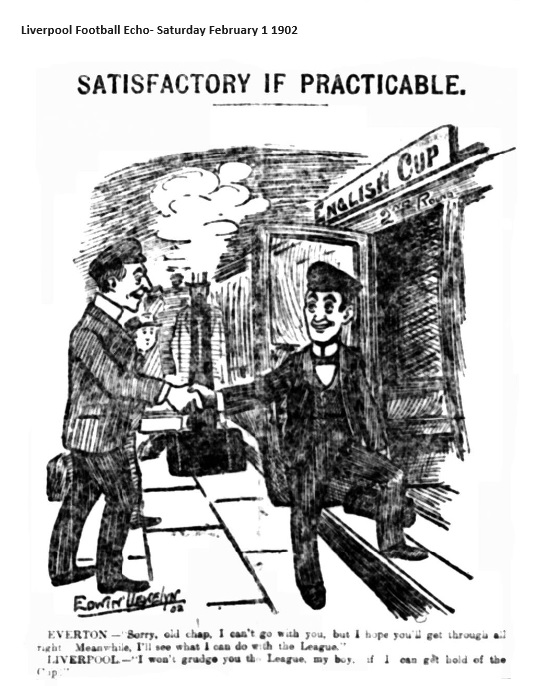
SHEFFIELD UNITED v. EVERTON.
Lancashire Evening Post - Saturday 01 February 1902
These teams met at Bramell Lane this afternoon, in find weather, before a crowd of 12.000 spectators. Both sides made several alterations. At the outset Everon, who faced wind and sun, had to act on the defensive, and during a melee in front Kitchen the custodian had a couple of good shots to deal with, which he got rid in cool fashion. Everton then had a turn, but the forwards were disjointed and could not get in close proximity to Foulke, and I United once more took the attack up the attack. Common putting in a capital fast shot. Singleton at outside left was hereabouts showing clever work, and twice broke through but in vain. The Everton custodian was twice exerted to the full. Barnes just missed scoring. Half-Time—United 0. Everton 0. In the second half United almost scored through Henley and Barnes, but Balmer was very safe back, whilst Everton's shooting was weak when they got well down, the ground accounting for many mistakes by both sides. United pressed hotly to the close, taking successive coners, but meeting a splendid defence, and though United pressed up to the finish nothing was scored. Result; United 0, Everton 0
This and That
Nottingham Evening Post - Saturday 01 February 1902
Southampton are partial ex-Everton left wings. Some time ago it was Chadwick and Mil ward, now it reads Chadwick and J. Turner. Stringfellow, the clever Portsmouth half-back, hails from Southport, and was lost to Everton through a question of railway fare from Southport to Liverpool each week. It is a rather curious coincidence that both Everton and Sunderland, the two favourites for League honours, have each six of their last ten Everton this season have been the means of unearthing two really promising centre-forwards in Young and Bowman, both of whom are coming the front with leaps and bounds.
TODAY TEAM NEWS
Liverpool Daily Post - Saturday 01 February 1902
Everton v Sheffield United, League match, at Sheffield.
Everton.- Kitchen, goal; Balmer and B. Sharp, backs; Wolstenholme, Booth and Abbott, half-backs; Sharp, Rankin, Proudfoot, Young, and Singleton, forwards.
Everton v Stockport County at Goodison Park; Kick-off 2.45.
Everton.- Muir, goal; Watson and R. Balmer, backs; Boyle, Clark, and Boyd, half-backs; Makepeace, Patterson, Bowman, Bone and Chadwick, forwards.
EVERTON v SHEFFEILD UNITED
Liverpool Football Echo - Saturday 1 February 1902
After their somewhat unexpected but wholly deserved defeat at the hands of Liverpool on Thursday last, this Everton eleven were at once taken away to Castleton, where it was hoped the invigorating air might being them back to something like reasonable form. They stayed at the Derbyshire health resort whence they came into Sheffield this morning. The weather in the cutlery capital was bright and fine, though bitterly cold, and the journey from Liverpool, made by a handful of enthusiasts was through a country hidden beneath a mantle of snow. The Sheffielders had no appeal preparation for the meeting, but a hard fought game was nevertheless anticipated and there was an excellent crowd of spectators present when the rival teams turned out. There were several changes in the Everton ranks from Thursday no less than three new men being brought in. These were Singleton and Proudfoot, who replaced Bell and Bowman and Rankin, who took the place of Taylor. Neither Singleton nor Rankin had hitherto appeared in First League football, and their debut was, therefore watched with considerable interest. There were three notable absentees from the Sheffield ranks in the persons of Lipshaw, Priest and Johnson. Prompt to time the teams faced each other as follows;-
Everton; Kitchen, goal; Balmer, and Bert Sharp, backs; Wolstenholme, Booth (Captain), and Abbott, half-backs; Jack Sharp, Rankin, Young, Proudfoot, and Singleton, forwards.
Sheffield United;- Foulkes, goal; Thickett, and Boyle, half-backs; Wilkinson, Morren, and Needham (Captain), half-backs; Bennett, Common, Hedley, Barnes, and Bourne, forwards.
Referee N. Whitaker, of London.
Needham won the toss, and Everton started against a slight breeze. After a slight advance on the part of the visitors this home eleven making play on the left, but Needham’s movements were marked by Balmer, who finally cleared very cleverly. Proudfoot then turned hard to get away, but Boyle was on the alert and the ball was sent spinning towards midfield. Here the home left again got down, and Barnes sent in a fine shot which passed across the goal mouth. Keeping up the pressure. The United left continued to keep the Everton defenders exceedingly busy, but Balmer and Wolstenholme behaved admirably, and the invaders were at length cleared out. Young and Proudfoot made rapid tracks in the direction of Foulke, but Thickett dashed in and cleared, and Bennett, getting possession, raced away at top speed, with a clear goal in front of him. He shot ridiculously wide. The United, however, speedily warmed to their work and a corner was forced off Balmer. From this Wilkinson sent in a shot that struck the crossbar, and a couple of seconds later Morren, catching the leather as it rebounded sent in a beauty which Kitchen was lucky enough to succeeded in fisting clear. Up to this point the argument had been all in favour of the home eleven, and though the Everton defence was fairly sound, it was more by good luck than good management that disaster was averted. Abbott at length was instrumental in relieving the pressure, and some smart work was put in by the Everton right wing, Proudfoot who was partnering Sharp, working well together, and the former finished the movement by sending in a shot that caused Foulke to handle. After this play was of a rather more even character, and a break away by the Everton left wing, which had so far been more ornamental than useful, made an agreeable diversion, but Singleton’s final shot was extremely feeble, and it was not long before the United forwards were once more in front of Kitchen. Wilkinson on one occasion served up remarkably well, and as a result Common sent in a lighting shot, which literally scraped the wrong side of the crossbar. A spell of desultory work now intervened, neither side shinning brilliantly though the home eleven always appeared the more confident of the two, and for a long time the game was fought in Everton territory. From a free kick close in Thickett brought Kitchen to his knee. The Evertonian was only enabled to clear partially, and Common catching the return sent in a hot shot at short range. Kitchen just saving it at the expense of a corner and a slight injury to his head. The corner came to nothing the ball being put behind, but a moment later Common from long range sent in a fine shot which Kitchen had difficulty in clearing. The struggle was once again going all in favour of the home team, who literally penned the visitors in, and it was only through erratic and perhaps careless shooting that no goal was scored. The going of course, was on the heavy side, and this to some extent hampered the players in exercising complete control over the ball. The long spell of defensive work on the part of Everton was at length relieved by Singleton and Rankin making off, but they found an insurmountable stumbling block in Thickett who cleared twice. Following upon his the Everton right wing tried to get through, but neither Sharp nor Proudfoot could apparently do any good, Boyle proving altogether too much for the pair of them. Still the visitors persisted very pluckily, and some nice work by Rankin gave Young a fine opening, but the Everton centre dallied too long, with the result that he was neatly robbed when about to shoot. The Evertonians were now playing football, and the Sheffielders for some minutes were kept on the defensive, though Foulke was very rarely troubled. Shortly before the interval the home forwards put on extra pressure, and a beautiful bit of worked ended in Barnes sending in a terrific shot which Kitchen cleared with marvellous skill. Then the visitors temporarily took up the running, and Sharp had beaten Boyle and looked very like scoring when Needham nipped in and saved the situation. A couple of minutes off half-time the Sheffielders renewed their attentions to the Everton goalkeeper, and Common sent in a hot shot, which was splendidly dealt with. Bourne immediately afterwards sent in a long shot, which was cleared. Then Barnes with an open goal in front of him, shot over the bar, greatly to the disappointment of the crowd. A minute later a corner was forced of Balmer, but this was safely negotiated and half time arrived with no score, though the home team had the bulk of the play.
Half-time score;- Sheffield United 0, Nil Everton nil.
Final Result; Sheffield United nil, Everton nil.
EVERTON COMBINATION v. STOCKPORT COUNTY
The Liverpool Football Echo -Saturday, February 1, 1902
The return Lancashire Combination match between the above teams was played at Goodison Park this afternoon, before a mere handful of spectators. The following were the teams;-
Everton;- Muir, goal; Watson and R. Balmer, backs; Boyle, Clarke, and Brown, half-backs; Makepeace, Paterson, Bowman, Bone, and Chadwick, forwards.
Stockport County;- Beaumont, goal; Chorlton, and Freeborough, backs; Potts, Suart, and Evenson, half-back; McLachlan, Parker, Sharply, Roberts, and Hinks, forwards. Bowman started for Everton, but during the first moves there was nothing in the play to excite the spectators. After a while the visitors ambled down to the Everton half, where Parker came in possession and shot for goal, but Muir cleared with great save. Everton came away on the right and soon afterwards the left wing took up the running, but Evenson finally cleared. A rather sudden burst on the part of the visitors ended in disaster for the homesters, Roberts found himself in a likely position at the finish and shot a fine goal some fifteen minutes after the start. A little later on Bowman equalised and after the visitors had made a half-hearted attack Everton returned on the right and Paterson nearly gave Everton the lead. Subsequently the visitors displayed some rather nice tactics and on a couple of occasions made good on the home defence. However the opposed to Stockport proved too powerful and the home team advanced and made rings round their opponents, but could not get in an effective shot. Once or twice great inroads were made by the Stockport right wings but they proved no match for either Watson or Balmer. The left wingers also relieved their hand, but were just as summarily treated, but the visitors kept boring their way in, regardless of opposition. Finally they were disposed of by Watson and Makepeace had a hand in tasking the ball down at the end of which move Chadwick scored for Everton. Another pretty pass from Makepeace to Bowman gave Chadwick a further opening, for which he shot wide and the visitors for which he short wide, and the visitors goal was subjected to another attack. Stockport gained a corner before half-time which was headed over by Sharpley. Half-time Everton 2 Stockport 1.
The commencement of the second half was marked by several well-marked passages on the part of the visitors, but eventually the home side came down cleverly and the restart was a goal for Everton from the midst of a scrimmage. A futile attack by the visitors and a barren corner to Everton followed. A rather silly goal came to Everton’s account from a free kick. Bowman and Paterson between them doing the trick. Final Everton Combiantion 7 goals, Stockport County 2 goals.
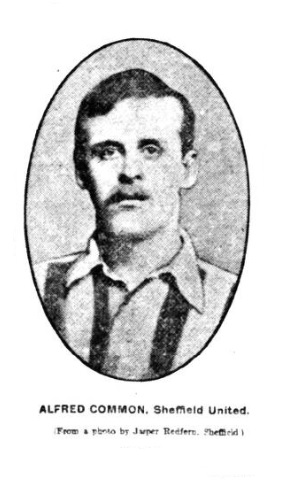
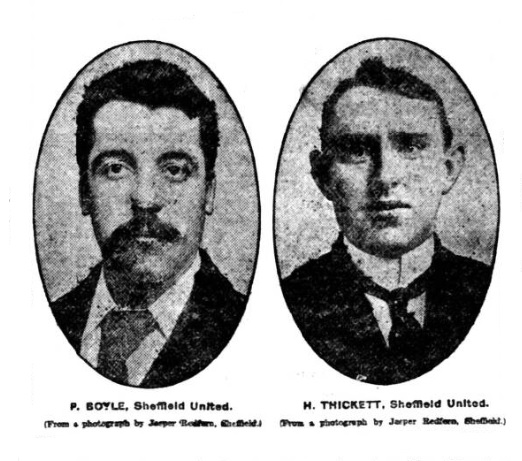
SHEFFIELD UNITED 0 EVERTON 0
February 3 1902. The Liverpool Mercury
Played at Bramell lane, before 14,000 spectators. Neither side was at its best representation. Everton faced a stiff breeze, and for a lengthy period were compelled to defend. The United forwards played up with great dash, and on several occasions the Everton goal had narrow escape. Following a short attack at the United end, Kitchen accomplished a couple of splendid saves from melees in the goalmouth, and just on the interval Barnes had an open goal, but failed to take advantage. At half time there was no scoring, and Everton, on resuming, with the wind now in their favour, showed a bolder front, but never looked like defeating Foulkes. Then Hedly and Barnes narrowly missed the net and Balmer, who throughout played excellent football, checked another strong attack. Towards the close the United pressed hotly, taking several successive corners, but the Everton defence held out splendidly and at the finish the game remained drawn. Everton: - Kitchen goal, Balmer and Sharp (b), backs, Wolsteholmes Booth (captain), and Abbott half-backs, Sharp (j), Proudfoot, Young, Rankin, and Singleton, forwards. Sheffield United: - Foulkes, goal, Thickett, and Boyle, backs, Wilkinson, Morren, and Needham, half-backs, Bennett, Common, Hedley Barnes, and Bourne, forwards.
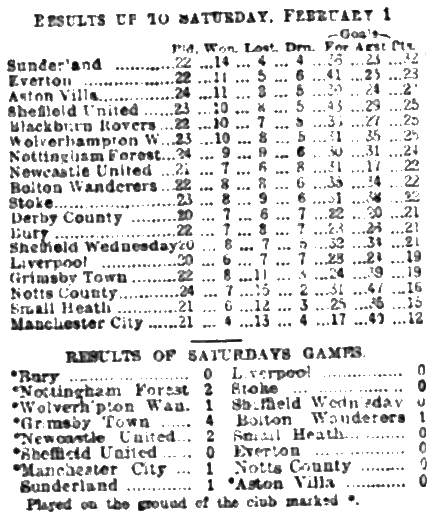
LIVERPOOL AND DISTRICT NOTES
Athletic News - Monday 03 February 1902
By Junius
The capital display given by Liverpool on Saturday last at Anfield had prepared many for their victory at Goodison Park on Thursday. Some idea of the intense interest in the tie may be gathered from the fact that fully 25,000 persons were present, which for a midweek game will, I should imagine, take some beating. As far as the actual play was concerned, there was only one team in it, and Everton never looked like winning. Two of their forwards were useless-Taylor and Bell- owing to injuries, and the executive have been blamed in some quarters for playing the outside left instead of trying one of the reserve players, a course which Liverpool did adopt by placing Davies as a partner for Cox instead of Fleming who was hors-de-combat. In justice to the directors it should be noted that they took every step to assure themselves that Bell would be able to play, and it was on reliable medical advice that they finally determined to put him in the team. Their sanguine anticipations, were, however, not realized and the Everton attack rested solely on one wing. The display given by Liverpool was most satisfactory, and there was no mistaking the confident air and assumption of superiority which dominated their every movement. They were fully two goals better than their rivals and that reverse in the League tourney will now be drawned in the triumphant wave of success which was engendered by the Cup-tie victory. The form displayed by the winners has been the means of producing more sanguine anticipations relative to the next round, and there is one thing certain, that if Liverpool can reproduce similar form, either the Cup-holders or Southampton will have to go all the way to make any impression on the Anfielders.
EVERTON DID WELL AT SHEFFIELD
Like their neighbours across the Park, Everton experimented with their forward line for their away fixture with the United at Bramwell lane. Bell, was unfit for play, and likewise Taylor, with the result that three reserve team players were called upon. The defence was left intact, and the directors exercised great discretion in deciding to leave this part of the team severely alone. Under these circumstances a goalless draw was a distinctly fine performance, for the excellent achievements of the “Blades” in recent games have not been lost sight of in this district. Everton, now that they are freed from Cup-tie troubles, will be at liberty to devote themselves to the attainment of League honours, and by averting defeat at Sheffield they have got over a very awkward obstacle with credit. Singleton, who played on the extreme left, was transferred from Bury about a couple of months ago., whilst Rankin, who formerly played for Kirkdale has been a rare utility man for the “Blues” Everton journeyed to Sheffield from Castleton and it seems as of the bracing air of the glorious Peak district had proved a serviceable tonic to the players.
REGARDING NEXT SATURDAY
With Liverpool drawn away and Everton without a match on their fixture card, Saturday next seemed like proving another blank day as far as local football was concerned. However, I may say that the Everton directors are in touch with two or three teams, and that some highly attractive friendly game will be fixed up for the Goodison Park enclosure. The rest from League games will be welcome, for Settle will be out of harness for a fortnight at least and several of the other League members will appreciate a rest.
EVERTON RESERVE WIN EASILY
There was a good crowd present at Goodison Park to witness the Combination match with Stockport County. Everton tried a brother of Balmer’s at left back, and right well did he perform. This youngster possesses all his brother’s well-known style in kicking and tackling. The visitors played up well and scored the first, but they could not hold Everton in the second half and the home side ran out winners by seven goals to two. Bowman played a good game in the centre. The visitors were by no means sop overplayed as the score would appear to demonstrate.
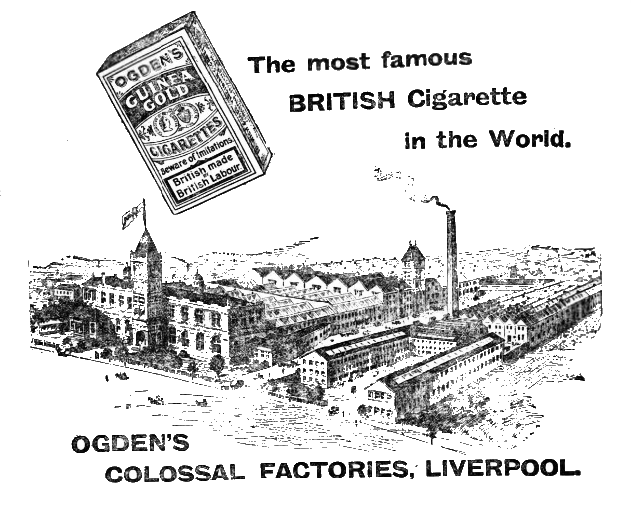
FUTILE EFFORTS AT LANE
Athletic News - Monday 03 February 1902
By Nemo.
A POOR DISPLAY.
The between Sheffield United and Everton at Bramall-lane was for the most part a tame, dispiriting affair, and not until well on in the second half were the 14,000 people present roused to any excitement. Neither side scored a goal, so that the contending clubs shared such meagre honours as were derived from a decidedly uninteresting contest. Doubtless the unfavorable state of the ground, which was frozen hard underneath with a greasy and slippery surface above, which even a liberal sprinkling of sand failed to make good, had a great deal to answer for, but the fact remains that the football displayed on both sides was of a decidedly mediocre character. Neither had their full strength available, for while the visitors had Bell, Settle, and Taylor away, the home team lacked the services of Priest, Lipsham, and Johnson. The United had certainly what is known as the best of the play, but their more numerous attacks had little sting against the stout defence of the Everton backs—Balmer and B. Sharp—and the cool custodianship Kitchen. As for the Evertonian forward play it was of so indifferent a character that Foulke, the United goalkeeper, had never throughout the whole game a shot of any real difficulty to deal with. I should think the visitors have the best reason to be satisfied with the result of the match, seeing that they took home a point from ground where points have been very difficult to capture for long time past.
THE GOALLESS GAME
Needham winning the toss, the Evertonians were set to kick against a breeze which, though fairly strong for a time, subsequently weakened and became of little account in the second half of the game. In the first few minutes the victors' goal very nearly fell, a shot by Wilkinson sending the ball against the crossbar, whilst just afterwards Kitchen skillfully got rid of a sharp return by Morren through a crowd of players. The Everton front rank could not make the slightest impression on the home defence, but their own defence was quite capable of dealing with the spasmodic rushes of the Sheffielders. Kitchen saved shots from Hedley and Common at fairly long range and one from Barnes close in. Just before half-time Barnes, unhampered, had a glorious chance of scoring for United, but after steadying himself and taking deliberate aim he lifted the ball high over the bar. Thus, though the Sheffielders had the best of the play, they could not score. As for Everton they never looked like doing so, and up to half-time Foukes had not had a shot to stop. Early in the second half a centre by Bennett brought about a lively scrimmage in front of the Everton goal, but Kitchen saved from Barnes. A lot of uneventful play followed. Then with the game well advanced the pace increased, and the forward play on both sides improved somewhat. Foulke, however, was not seriously tested, while Kitchen at the other end was well protected by the two Everton backs. Once from a centre by Bourne, Bennett had a grand chance of scoring. He had an open goal— bar Kitchen—and plenty of time, but shot feebly yards wide. Everton made several promising advances, but found Boyle and Thickett in the way at the critical moment, and for the most part the Goodison Park men had defend, which they did well to the end of the game, and so finished on level terms.
A FEW REMARKS
It was a distinctly poor game. On the Everton side there were no indications of League Championship form, nor any signs of English Cup winning ability; on the part of United. We must charitably suppose that both sides played considerably below their reputation—or put their failure down to the bad state of the ground which was decidedly treacherous and difficult to play accurate football upon. With only two of their first team forwards playing some excuse may be offered for the weakness of the Everton attack, and perhaps some of the United players were thinking of the English Cup-tie next Saturday instead of League points. United ought to have won, considering the advantage they had on the play, but Kitchen in , goal and Balmer and B. Sharp at back were just too good for their forwards when the pinch came. Bourno and Barnes are distinctly below Priest and Lapsham as a left wing, but the two usual right-wingers, Bennett and Common did little worth mentioning. Everton; Kitchen; Balmer, and B. Sharp; Wolstenholme, Booth, and Abbott; J. Sharp, Proudfoot, Young, Rankin, and Singleton. Sheffield United;- Foukle; Thickett, and Boyle; Wilkinson (B), Morren, and Needham; Bennett, Common, Hedley, Barnes, and Bourne. Referee; Mr. N. Whittaker (London).
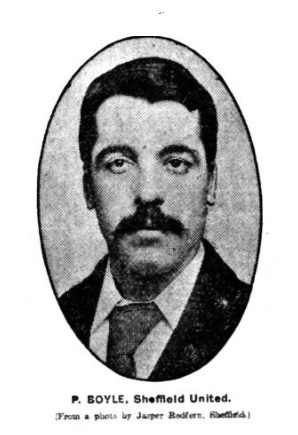
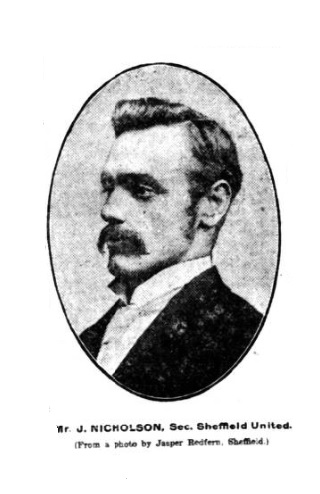
EVERTON RESERVES 7 STOCKPORT COUNTY RESERVES 2
February 3 1902. The Liverpool Mercury
Lancashire Combination
At Goodison Park, in brilliant weather, and before a good gate. County won the toss, Bowman kicking off against the wind, and after desultory play Roberts opened the scoring for the County. Bowman equalised and Chadwick placed Everton ahead, before half time. Resuming Everton attacked strongly, and the ball being rushed through during a scrimmage. Patterson then added a fourth, and the County put an other one and eventually Everton winning by 7 goals to 2. Everton: - Muir, goal, Watson, and Sharp, backs, Boyle (captain), Clark, and Blythe, half-backs, Paterson, Bowman, Proudfoot, Bone, and Chadwick (j), forwards.
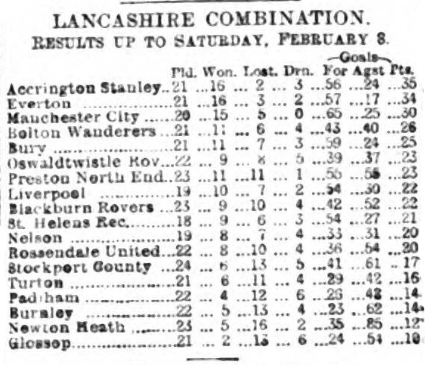
SATURDAY’S FOOTBALL
Liverpool Daily Post - Monday 03 February 1902
Under the circumstances, both Liverpool and Everton deserve congratulations in bringing home a point each from their engagements respectively at Bury and Sheffield. Neither our clubs was well represented. Recent events had given both teams a gruelling, and a little rest was needed for recuperating purposes, especially on the part of Liverpool, who will have “to South at the end of this week to meet Tottenham or Southampton—probably this evening we shall know definitely which—in the next round of Cup ties. While on this subject, we might refer briefly to last Thursday struggle at Goodison Park. The result of this replayed tie staggered most people—Evertonians especially. They could not understand the poor exhibition of football given by the home contingent, who towards the finish of the game practically “chucked up the sponge,” and acknowledged themselves beaten. We were told by a Press interviewer the week before, who had visited them at their training quarters in Southport, that the Everton team was physically fit, and determined to win. The public certainly expected them to win—on form—when they met the first time Anfield, but, as we remarked in this column last week, they were then very fortunate in getting another opportunity to try and qualify for the second round, as their draw was lucky one. Still, the Everton supporters had great faith in their team; they looked upon the play of Liverpool as a mere flash-in-the-pan, and that when they again met Everton it would be all u-p with Anfield and the Cup. That the Liverpool play was not as fluky as it was tried to be made out, was proved on Thursday. From forward play to goal-keeping the team never looked like winners, at least after the first quarter of an hour. Ni blame can be attached to anyone, of course: but feel that the directors were ill-advised to play John Bell, knowing as they did, or must, that he was suffering from a hurt received accidentally in the previous game. The Liverpool management was a bit wiser in their generation. They,too, had a player (Fleming) who was not quite “sound in wind and limb.” As the saying goes, for the occasion, and counsel was taken whether or not it would wiser play another man, who was ‘‘sound,” than to trust their fortunes to a partial “cripple,” with the chance that the latter would have go off the field when the game probably had just started, and thus handicap the rest of players. Liverpool put Davies, a young Combination player, in Fleming’s place, and right well did justify the trust imposed in him. Everton played John Bell, who was not in a condition to do himself justice. We trust, whether it be Tottenham or Southampton Liverpool next face, they will meet with the same success they had last Thursday. If they play as good game they will be sure to win.
SHEFFIELD UNITED v EVERTON
Liverpool Daily Post - Monday 03 February 1902
Played at Bramall-lane, on a treacherous ground, before about 15.000 spectators, the gate receipts realising£394 odd. Neither side was at full strength. United having three and Everton four reserve men playing. With a strong breeze and the sun in their favour, the home lot had much the better of some scrambling play at the start, Kitchen quickly having to save shots from Wilkinson and Hedley, while Needham was just wide. Common led several dangerous runs by the home forwards, and twice called on Kitchen with close shots. Barnes, too, caused him trouble, but missed another easy opening, and at half-time neither side had scored. Evertonhaving the wind in their favour, quickly took up the attack on resuming, but with the exception of one long shot from Wolstenholme, they did not trouble Foulke, and after the first few minutes the game became more open and even. The backs of both sides were playing steadily, and rarely did either goal look like falling, though once Kitchen had to fist away a centre from Bourne. Bennett swung the ball in front, and United for a time showed the better form in midfield. Amid some little excitement Foulkehad a difficult dropping shot to clear close on time. The game ended: Sheffield United nil, Everton nil.
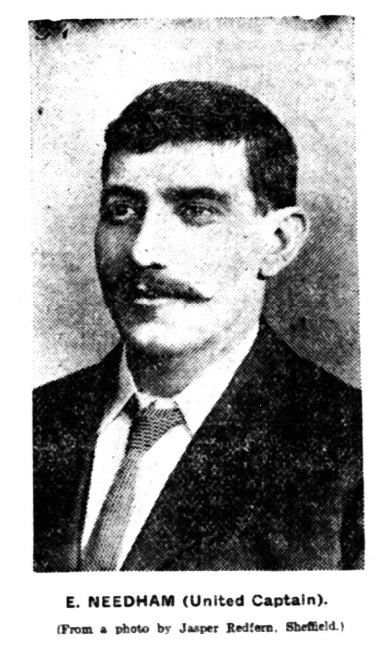

SHEFFIELD UNITED v EVERTON
Sheffield Daily Telegraph - Monday 03 February 1902
A DISAPPOINTMENT AT BRAMALL LANE
Prospects of a really fine game in the return match between these teams at Bramall Lane on Saturday were upset through thaw, which rendered the surface of the ground very treacherous, and good football was impossible. Both teams held many changes, owing (on the part of the visitors) to their exertions in the Cup, and such men as Bell, Settle, Taylor, and Eccles were all away. Their places were filled by Singleton, Rankin, Proudfoot, and Bert Sharp (brother to the better-known outside right). United also had several men absent, and Bourne, Barnes, and Morren appeared instead of Lipsham, Priest, and Johnson. There was a good crowd present, the official figures being that 14,306 people actually paid, and that the receipts were £394 5s. 9d. The game ended in a draw, nothing being scored by either side. Everton lost the toss, kicking off towards the Shoreham Street goal in the first half, and the opening movements saw the Everton goal well besieged, but good work by Abbott sent Bennett back. This set the Evertonians away in a pretty dribble, but Young's pass found touch, and United again raced down in rather ragged fashion. United kept in the Everton half for some little time, and obtained a fruitless corner, Wilkinson getting in a fine shot which hit the bar. A lot of smart work followed, close in, Morren eventually driving the ball hard into Kitchen's hands, and he cleared well out into midfield. An incursion to the other end followed, but Thickett cleared, and Wilkinson brought off a very clever clearance against Singleton as the latter took Young's pass. At this stage the United men were facing an almost blinding sun and were thus badly served, but the balance of play was still in their favour, the Evertonian advances being distinctly ragged. At last Everton got a footing in their opponents' territory, Singleton again getting away, but again was he beaten, by Wilkinson, and the other end Bennett forced a corner. Hedley, when sadly hampered, brought out Kitchen for a clearance, whilst Common was penalised for jumping at Booth when he was in full cry for goal, but again Everton were dispossessed, and Common just got the ball over the bar with a tremendous effort. Young was well off-side in the course of an' infrequent advance, set up by Booth and Wolstenholme, but still the home vanguard failed to break down that solid line of defence against it. However, once, from a very well-placed free-kick, the ball was landed into goalmouth by Thickett, and with Kitchen failing to clear cleanly, a short sharp shot by Bourne cannoned behind just the wrong side of the post, when success seemed certain. Needham placed the flag-kick behind, whilst in the course of another advance, Barnes was well offside as he accepted Bennett's pass. Again the home team swept in, and a terrific shot by Common from forty yards out struck the watchful Kitchen on the knee, and rebounded safely. Once Kitchen had to run well out of goal to get rid of an easy shot, but for the most part his work was easy, whilst such advancesas Everton made were readily encountered. At this stage of the game Everton were easily holding their own, but play was disappointing. Kitchen had more work than Foulkes to get through, but, although United attacked hotly toward the interval, he remained unbeaten, and the teams crossed over with nothing scored. The second half saw United make a momentary advance, but were checked by Balmer, whilst Thickett in turn cleared well from Young. In the course of another advance by the Sheffielders a rare bustle took place right in the jaws of the Everton goal, after Bennett had sent over a perfect centre. Half a dozen times it seemed certain that either Hedley or Barnes would get the ball, but Balmer stuck to his work in rare fashion, and Kitchen eventually cleared. More work in Everton's quarters led to Balmer again in defence, whilst Proudfoot had an undeniable chance right in front of Foulkes, but the ball spun off his foot at right angles, and one of Young's scoring efforts was a trifle wide of the mark. Still Everton hereabouts were having a good deal the better of the argument, and for a few minutes more than held their own. They were eventually sent back, and an accident to Hedley brought about a cessation of the game. There were very few features in the game. At length a brilliant burst by Common and Bourne led to the latter again putting in fine centre, but the ball was met by Kitchen before Bennett had a chance, and all danger removed afresh to midfield. United were having all the better of the play hereabouts, and after Young had been given rare opening clean in front, with Morren well on him, a corner at the opposite end was forced Bourne, but, though well placed, Wolstenholme cleared well in front of Kitchen, and a free-kick for offside sent United back to their opponents' goal again, another corner being forced which Booth handed away. Bennett had a chance, but made sad mess of it, and though United pressed to the finish, it was in vain.
Result: Sheffield United 0 goal, Everton 0 goal. Teams:—
United.- Foulkes, goal; Thickett and Boyle, backs; Wilkinson, Morren. and Needham (Captain), half-backs; Bennett, Common, Barnes, and Bourne, forwards.
Everton;- Kitchen, goal; Balmer and B. Sharp, backs; Wolstenholme, Booth (Captain), and Abbott, half-backs; J. Sharp, Proudfoot, Young, Rankin, and Singleton, forwards Referee, Mr Whittaker (London).
SHEFFIELD UNITED v EVERTON
Sheffield Independent - Monday 03 February 1902
Despite the bitterly cold weather, there was a capital attendance at Bramall lane on Saturday to watch the between Sheffield United and Five Everton, the reputation of the visitors as one of the most successful teams in the League this season proving, doubtless, some source of attraction. The officialfigures show that the receipts amounted to £394 5s. 9d., and that the total attendance was 14,306. The game, however, scarcely proved worthy of this excellent "gate,” for owing, doubtless, in a great degree to the treacherous condition of the ground, much of the football seen was inaccurate and disappointing, rarely rousing any excitement among onlookers until late in the contest, when the United, urged by their supporters’ shouts, made a determined but fruitless effort to score. Neither side succeeded in getting a goal, though the Sheffielders had considerably the belter of the play, without, however, being able to pierce the excellent defence of the Evertonians. Neither dub was at full strength for whilst United had Johnson, Priest, and Lipsham away. Everton had to depend upon three of their reserve forwards, neither Bell, Settle, Bowman, or Taylor being available, though the visitors defence was fully representative. The ground, frozen hard underneath, had thawed on the surface, which was soft and slippery, despite a covering of sand, and repeatedly the ball beat the players particularly in the early part of the game, before they had become used to the conditions. Needham winning the toss, selected the goal at the Bramall Lane end of the ground, United having the benefit of a fairly strong breeze. The opening exchanges were in favour of the home team, for whom Barnes shot wide, the work being done for the first few minutes almost entirely on the left wing, though once Bennett on the right shot very wide. The Sheffielders, with the sun now shining out against them,forceda corner, which was followed by a hot attack on the Everton goal, during which Wilkinson shot against the cross-bar, and Morren gave Kitchen a low shot deal with. Even play followed, but accuracy in kicking on the treacherous ground was very difficult, and there were several instances of miskicking. Singleton several times looked like threatening danger from the Everton left, but Wilkinson or Boyle checked him. At the ether end Common once got in a fine long shot which went only just over the Everton bar. Play was distinctly tame and uninteresting, the state of the ground doubtless being partly responsible. United certainly did the more pressing, and once Needham, taking a free kick, paired back to Thickett, from whose return there was a dangerous attack on the visitors’ goal. Kitchen stopping a slow rolling shot from Healey. Kitchen was hurt in a charge, but and a comer to the Sheffielders was disposed of play, however, remained in the Everton quarters and Common sent in a long shot, which Kitchen did well to get rid or, at the expense of another unproductive corner. For a long time there were few incidents of note, except that several performances of the players on the uncertain ground were of a rather humorous nature. Everton could not get near enough to Fouke to have any real chance of scoring and such attacks as there were took place at the other end. Once Kitchen saved skilfully a sharp shot from Barnes, and Balmer and B. Sharp defended well for the visitors. Kitchen also turned aside a long slow shot from Common. A few minutes before half-time a dash by the United left Barnes with an open goal, but he lifted the ball high over the bar. United also failed to get through from a corner, and at half time there had been no score. The first incident of note after change of ends was a spurt by Bennett on the United right, and a square centre that player followed a scrimmage in front of goal, from which Barnes shot in, Kitchen, however, getting the ball away. Some passing in mid-field enabled Wolstenholmeto fire a long shot at the United goal, but Foulke easily caught the ball and saved. A well-organised attack by the Everton front rank—the best they had yet made—gave the visitors their first corner of the match, but Abbott shot high over the bar. With United attacking Hedley was hurt, but was soon able to resume. After some uneventful play in midfield the United left wing bore down, and Bourne swung in a long centre, which Kitchen, by coming out judiciously, effectively disposed of. Everton occasionally made a rush to the other end, but their shooting was wild and inaccurate. Once Foulke had to rush out and pick up the ball just on time to avoid a rush by Young. Then Bourne, forcing a comer for the United, a series of desperate attacks from this and other corners, and free-kicks, were made, but the Everton defence stuck pluckily to their work. Play was livelier than It had been. Needham judiciously nipped in just in time to prevent Young, who was rather lame, getting through the home defence. Another effort by the Sheffielders saw Bourne with a good centre give Bennett a lovely chance, but the latter shot wretchedly wide. At the other end J. Sharpe, by a skilful lofty screw from near goal line, called upon Foulke. United did the more pressing as time drew near, being anxious to score, but the visitor were equally determined, and Kitchen kicked away a dangerous shot following a free kick. Boyle stopped a threatening rush for the home goal. A free kick given against Boyle threatened the home goal, but the danger was soon averted. At the other end Needham well placed a couple of free kicks for United, but the home forwards failed to rush the visitors’ defence, which remained strong to the end, the game resulting in a draw.
Sheffield United 0 goal, Everton 0 goal.
Sheffield United;- Foulke, goal; Thickett and Boyle, backs; Wilkinson, Morren, and Needham (Captain), half-backs; Bennett, Common, Hedley, Barnes and Bourne, forwards.
Everton;- Kitchen, goal; Balmer and B. Sharp, backs; Wolstenholme, Booth (Captain) and Abbott, half-backs; J. Sharp, Proudfoot, Young, Rankin, and Singleton, forwards. Referee; Mr. N. Whittaker (London).
TODAY TEAM NEWS
Liverpool Daily Post - Saturday 08 February 1902
Everton v West Bromwich Albion, at Goodison Park.
Everton.- Kitchen, goal; Balmer and Sharp, backs; Wolstenholme, Clarke, and Abbott, half-backs; Sharp, Rankin, Young, Proudfoot, and Singleton, forwards.
Everton Reserve v Bolton Wanderers Reserve, at Bolton
Everton.- Muir, goal; Watson and Eccles, backs; Brown, Boyle, and Blythe, half-backs; Roche, Paterson, Bowman, Bone and Chadwick, forwards.
THREE NEW PLAYERS FOR EVERTON
In this friendly at Goodison Park today the Everton directors will play three new men. They are three Welsh internationals- Miller, centre forward; Tudor, inside left; and Lathom, inside right.
EARLY GAMES IN THE MIDLANDS
Lancashire Evening Post - Saturday 08 February 1902
By William McGregor
There is no district England which has produced a more interesting football history than the Midlands. I remember the game in Birmingham and district when it was quite in its infancy; but even in the earliest days used to get some capital matches. There were not many clubs in the district when I was first attracted to die grounds of the Calthorpe, in Bristol-road; the Birmingham Club, which flourished at the Lower Grounds, then controlled by the brothers Quilter; Aston Villa, at Wellington-road, Perry Barr; Small Heath at Muntz-street (whore they are to-day); St. George’s, at Fentham-road,Birchfield’s (what a swamp it was!); and Aston Villa, at Aston-lane. But the best football in the early days was seen the Lower Grounds. The club there was by far the most enterprising of the local organisations, and used to call upon most of the prominent players in the Midlands to assist them in their tightest games. I have seen some of the celebrated Lyttleton family on their side; George Ramsay (the Villa captain), Tom Bryan (of Wednesbury Strollers—the captain of the Birmingham Association team), also used to give them a lift; so did Alf Harvey and Eli Davis (of Wednesbury Strollers, and later of the Villa), and that delightful little player, Howard Vaughton, was a frequent member of the side. And they wanted all this extraneous talent, too, for they used to tackle some of the strongest teams in the country. They had regular fixtures with Notts Forest and the Sheffield Club, then at the top the tree in the Midlands, and ranking among the best teams in the whole country. I have seen J C. and W. E. Clegg play there, and the matches with Notts Forest used to be exceedingly interesting.
SAM WIDDOWSON.
Those were the days when the redoubtable Bam Widdowson used to lead the Forest forwards. Widdowson a great sportsman. He was the most dangerous centre in the whole England. He was a magnificent dribbler and a splendid shot, and he could run like hare. Who, of that day. does not remember the great performances over hurdles of Sam Widdowson, Sam Bestow, and later C. F. Daft, F. F. Cleaver, and C. W. Gowthorpe? They always turned out the hurdlers in Nottingham, and Sam Widdowson was one of the best of them. There was not a better known footballer in the country. His sensational dribbles—and they really were sensational —were always the feature of the games at the Lower Grounds between the Birmingham Club and the Reds. Goodyear was another fine Forest forward, so was Earp, while the Luntleys and Caborn were the best defenders. Notts Forest used to adopt a carious defence. The regular disposition of a football team in three days was two backs, two halves, and six forwards, but the Forest usedto play a full back (Caborn), three quarters (the Luntleys), and two halves.
BIRMINGHAM CUP FINALS.
The first Birmingham Cup final in 1877 I well remember. It took place atthe Calthorpe Ground in the Bristol-road, and ended in Wednesday Old Athletic defeating Stafford Road by goals 3 to 2. My old friend, Charles Crump, captained Stafford Road. How well I recollect the two teams entering the field. I took to the Stafford Road men straightaway, because they looked so spick-and-span, and, moreover, they wore the Queen's Park jersey. I had never seen either team before, and knew little about them, but I was not prepossessed by the Wednesbury men, whose colours were rather gaudy. Most of the players wore mufflers of bright and varied colours round their necks. Crump wore his eyeglass, which often troubled him by falling off. But the Old ’Uns, as they were generally called, could play good football, and they were a fine team in their day. I have seen nearly every final of the Birmingham Cup since that year, and not a few the semi-finals. There was one very fine final at the Lower Grounds—the meadow is now built upon, the present, Villa pitch being quite a different site—between the Villa and the Old Athletic. The Wednesbury men had a very fine team, and sure were their supporters of winning, that it is said they brought a band with them to play the conquerors home to the Black Country. There was a record gate for those days, the Association taking £110, and each of the composing clubs receiving a like sum. Our local councillors were quite of the opinion that this would be the high-water mark of football in the Midlands—their idea being that professionalism would kill the game and they did not hesitate to say so. The Villa won, after giving a very fine display football. The final of 1881 was probably the most sensational of the whole series. Walsall Swifts and the Villa were the contending teams. The Swifts had their brake overturned while driving over from Walsall, and some of the men narrowly escaped being killed. I spoke to the then secretary before the match, and be was in tears at the condition of themen. However, they turned out, some of them with bandages on their arms and hands, and the crowd gave them a rousing reception, for they were a very popular side. The Villa had brand new black jerseys with a rampant yellow lion on their breasts. The cripples went off with a great rush, a scored a point, and kept the Villa out by packing their goal. This defeat was a sore disappointment for the Villa, who were playing in most brilliant form the time. George Copley, the Villa goalkeeper, who was home from Singapore a short time ago, felt the reverse so keenly that he burst into tears when he got to the dressing room. The men’s hearts were in their work in those days.
A GREAT GAME WITH NORTH END.
I am tempted to refer to the great game at Perry Barr January, 1888, between the Villa and Preston North End, because no match ever aroused more genuine and more widespread interest. The crowd, 22,000 (there were probably more present, but that number paid for Admission), was by far the largest ever seen at a football match up to that period. The spectators broke the barriers and invaded the field play. After a wait the game was proceeded with, and then the Villa scored, and there was another encroachment. The captains conferred, and agreed to abandon the cup-tie and play a friendly game, the officials agreeing to this course. I have a letter from Archie Hunter to this effect. Both captains, Archie and Nick Ross, are alas, no more. The officials were J. C. Clegg, referee, and M. P. Betts and C. J. Hughes, umpires, and their report to the Association was that both teams agreed play a friendly game. I always think that the action of North End in claiming the match was a blot on their sportsmanship. They won three goals to one—what perfect football they played; but the Villa were leading when the teams agreed that the game should be a friendly. The rules then were not what they are to-day. The decision of the Association to award North End the match was only arrived at by the casting vote of the chairman, Major Marindin. It was decided to award the match to North End on the ground that the onus of keeping the field clear lay on the home team. I am still of the opinion that this was an unfair decision, and some of those who voted against the Villa have since expressed the same opinion. When the crowd broke in, mounted police were telephoned for from Birmingham by the officer in charge of the Staffordshire police.The Villa originally asked that mounted men should be sent, but the Staffordshire authorities could not or would not comply with the request. A dozen Birmingham police were soon in attendance, although they had to be taken off the streetswhen the request arrived. One rather stout constable fell off his horse into the mud, but taking off his dirty overcoat he hung over a dray and remounted. Another constable who was on duty in the office was so anxious to see the match, that there was a spare horse he begged to be allowed to go. As the detachment started off at a smart pace, he was hanging on the horse’s neck before the cavalcade had gone far. When they arrived, they kept the crowd back very nicely. Prior to their arrival two cab horses were unharnessed, and an infantry soldier and a cavalryman mounted and helped to keep the people in their places. One of the pair had no bridle to his steed, and the crowd pushed him and his horse outside. The appearance of a couple of soldiers moved one evening paper to issue the following content* bill: ”Riot at a football match; the military called out.’ The crowd were very good-humoured, and little or no damage was done except to the soldiers’ uniforms, and the Villa paid. The Villa put the stand now at Small Heath on the Perry Barr ground at the beginning of the season, the members taking up shares. With the proceeds of this match they repaid all the shareholders, and gave them 5 per cent, for the use of the money.
THE RISE OF THE ALBION.
I have filled my space, but I must refer to the appearance the Albion, then practically unknown, at Perry Bar in 1882. in a Staffordshire Cup tie. They drew the game, and then routed the Villa on the Saturday before Christmas at Four Acres. This feat made the club. I had lots of inquiries made to me about them, some people wanted to know where West Bromwich was. Mr. J. J- Bentley called on me shortly afterwards; was secretary of Bolton Wanderers, and wanted to arrange a match with the Albion. I had to tell him how to get to Bromwich. Most people know where it is now. Of the grand goalkeeping of J P. Hawtrey for London v. Birmingham I should like to but I have exceeded my space. I never seen an exhibition.to compare with it. But he never kept goal so well again, and against Scotland for England was quite a failure.
EVERTON v. WEST BROMWICH ALBION.
Reading Observer - Saturday 08 February 1902
This match should have been played at Goodison Park. Snow fell heavily from early morning, and it was impossible to clear the ground, consequently there is no football in Liverpool to-day. Such a total absence of football on Saturday has not been experienced in this district for many years.
Note Bolton Wanderers Reserve v Everton Reserve Postponed
EVERTON REVIEW
February 10 1902. The Liverpool Mercury
Not a fixture was decided in the district on Saturday, and rarely has such a complete cessation from football been witnessed. The heavy down fall of snow caused among of abandonment's, the friendly game at Goodison Park, where West Bromwich have put in an appearance. The ground, and stands were, however, covered to a depth of several inches with a white mante, and early in the day the Albion were telephoned not to make the journey. Everton intended playing two new forwards from Newtown, and these recruits will be given an opportunity of showing their skill at an early date.
SAM WOLSTENHOLME
Athletic News - Monday 10 February 1902
Sam Wolstenholme, who has taken Dicky Boyle’s place in the Everton eleven, is a right half-back of 5ft 9 ½ in, weighing 12 stones. As he was born at Little Lever, near Bolton, he is also a thorough Lancashire lad. Like the Blackburn Rovers, he has, too, always played with a Lancashire club, for prior to joining Everton he had learned his game at Farnworth and Horwich. A man who plays the full ninety minutes, Wolstenholme is also a fine tackler and a rare support to his own forwards. His name has often been mentioned as a likely candidate for International honours, and these may soon come his way.
BLACK CAT
Athletic News - Monday 10 February 1902
One of our subscribers at East Cowes writes;- “I read with amusement the account in the Athletic News’ of January 27 of the Black cat taking part in the proceedings of the Everton and Liverpool match, but it is not the only case on record, for if memory serves me right a similar occurrence took place at Southampton last year, and strange to say it was the English Cup match between the “Saints” and Everton. A cat sprang through the glass side of the stand and made its way along the touchline, and after several fruitless attempts to score through the side of the goal net, rushed round to the opposite corner flag and disappeared. The Everton goalkeeper seemed a bit surprised at his novel opponent, but so far as I could see did not claim for offside. I should think after this the Evertonians would think seriously of adopting a black cat as a coat of arms.”
ANOTHER BLANK DAY.
Athletic News - Monday 10 February 1902
By Junius
Fog, frost, and other elemental conditions have combined during the present season to seriously interfere with the pre-arranged fixtures of many clubs throughout the country, but not till Saturday had the Goodison Park enclosure presented an unplayable aspect. A friendly with West Bromwich has been arranged, but early in the day Mr. Cuff, the Everton secretary, wired to the Hawthorns that it would be useless for the prospective champions of the Second Division to make the journey. This communication was received with some surprise by the West Bromwich secretary, and speaking there through the telephone, it did seen surprising that whilst at one terminus there should be a comparative calm, at the other extremity the ground should be covered with a snowy mantle to the extent of several inches. I paid a visit to the Goodison park enclosure in the afternoon, and found the editor of the Official Programme hard at work with his telephone results. And ‘twas sorrowful news that was flashed from Southern regions on our anticipatory ears.
EVERTON PROSPECTS
Everton are now devoting themselves solely to the attainment of a high position in the League, and all hopes of premier honours are not yet lad aside. Settle and Bell are once more sound, and will be ready for the League game at Bury on Saturday next. The mishap to their left winger made a wonderful difference to the Everton attack in the Cup-tie with Liverpool and with this branch of the forward line once more fit, more sanguine anticipations will follow. Taylor will not be ready for some time, and it will be necessary to obtain a fresh partner for Sharp in the right wing. For the friendly with West Bromwich some new talent was to be introduced, hailing I believe, from the salubrious district of Newtown. I have my doubts as to these players being Welsh Internationals, as was stated in some quarters, though it is possible that the trial games this week may include one of the three forwards who should have played against the “Thistles” I simply mention this fact as showing that the Everton executive are fully alive to future requirement and are strengthening themselves accordingly.
EVERTON RESERVES V BURY RESERVES
Lancashire Evening Post - Saturday 15 February 1902
At Goodison Park. The visitors were completely overmatched, and in the first half Chadwick, Bone, Bowman, and Patterson all scored for the home side, who led at the interval by four goals to nothing. Nothing further took place, Everton being content with the lead, and Bury failing in their attempts to score they played a spiritless game. Result; Everton reserves 4, Bury Reserves 0.
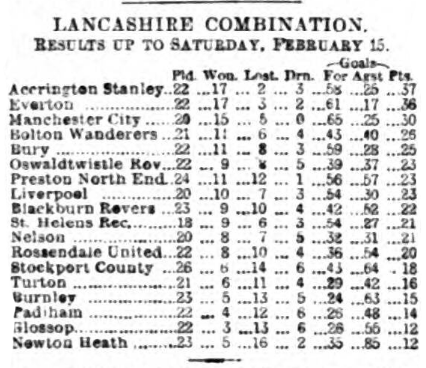
TODAY’S FIXTURES
Liverpool Mercury - Saturday 15 February 1902
Everton journey to Bury, where a fortnight ago Liverpool succeeded in sharing the points after a feeble game of football. Bury the previous week had beaten West Bromwich by scoring five goals in a cup-tie, and they now face Everton, after having in like fashion obtained five goals in the second round at Walsall. If Everton mean to have a say in the destination of the championship they will have to win today, for Sunderland now freed from Cup-tie troubles, will concentrate their energies on the acquisition of the League trophy. As the Wearsiders are four points ahead of Everton, the latter cannot afford to drop points at Gigg lane.
Bury v Everton, Bury- Referee JH Strawson; linesmen R.B. Murray and A.H. Downs.
Bury- Montogomery; Lindsay and McEwan; Johnston, Thorpe, and Ross; Richards, Wood, Sagar, Gray, and Plant. Everton; Kitchen; Balmer and Sharp; Wolstenholme, Booth, and Abbott; Sharp, Proudfoot, Young, Settle, and Bell.
Everton Reserve v Bury Reserve, Goodison Park, Kick-off 3 o’clock.
Everton;- Muir; Watson and Eccles; Boyle, Clarke, and Blythe; Rankin, Paterson, Bowman, Bone and Chadwick.
REFEREES AND THE RULES
Lancashire Evening Post - Saturday 15 February 1902
By WM. McGregor
Football is a comparative simple game; indeed, it is a very simple game. Writing, as I do, so much for the Association school, I am not apt to speak of Association football as though it were the game, the whole game, and nothing but the game. This is hard upon the Rugby code, and I must ask the followers of that noble pastime not to regard the use of the comprehensive term in a restricted sense is a slight; it is merely a convenient, conventional way of putting it. Personally, I think the Rugby game is “real football” ; if in that game the players use their hands, it can be said that in the Association game they use their heads. That is not meant to be a deep observation -I only mean to imply that they use their heads for the purpose of propelling the ball. Rugby football is rather a complicated game. I believe that fact has prevented it catching on with the crowd to the extent that the Association game has caught on. The average working man doesn’t want to think much over his amusement; he wants them to appeal to his emotions rather than to his intellect. Hence the popularity of the melodrama. But that is another matter. To return, after this rambling introduction, to my original statement- Football is a comparatively simple game. The rules are few and are couched in simple terms. They could be committed to memory by the average man in an hour or two. And yet these poor few simple rules are for ever being written upon, and analysed, and diagnosed and parsed, and congregated, and twisted about, and turned inside out, and dissected, and vivisected. For whose benefit? Honestly, I don’t know. The rules have never been a source of great trouble to me. I used to referee years ago, and I never found much difficulty in keeping the game going to the satisfaction- the apparent satisfaction, at any rate- of those concerned in it. Few as the rules are, the ordinary public do not try to master them, and they will not try to master them, no matter how many columns of analysis are put before them. Personally, I am inclined to doubt if they read much about them either; budding referees may do so, but referees are not a numerous class compared with the great mass of the playing public.
TOO MANY THEORISTS
It has elaborate disquisitions upon the laws of the game. In saying this I am not disparaging the lectures which I have heard such men as Mr. Lewis and Mr. John Adams deliver. Those are particularly in structive, and they have the merit of being interesting, too. I am speaking sighingly of the learned disquisitions which are penned upon these harmless little laws. I believe the tendency of such articles is to confuse rather than elucidate. And I am ready to defend with argument the position I have taken up. Referee, as a class, are not to be compared with the men who used to officiate years ago. They are crammed so full of theory that they neglect what is of far more practical utility, and they look to the book for everything. I believe that of some of the most learned of these theorists would condescend to take the field they would soon fall from their high estate. I have read some of these intricate articles, and have by me a list of hundreds of what seem to me to be very silly questions. One young referee asked me once what I should do if the ball stopped on the crossbar. The only answer I gave was, “Why fetch it down again and go on with the game.” I do not see that it would matter much what you did so long as you did something. You might do a worse thing than throw it up at the corner flag, although the rules say nothing about your doing anything of the kind. I do not see who could blame you if you did that; I do not suppose for a moment that you or I will ever see the ball rest on the crossbar, but if it did so while a game was under my direction it would trouble me very little.
A REFEREE’SDUTY
I put down a great deal of the present day inefficiency of the referee to the cramming with theory to which he is subjected. The man who always relies on notes mars his memory, and that is not a good thing; the man who devotes his life to learning what to do in case some miraculous incident occurs finds that his originality flies from his brain. There is no room left for it. There is one great law which many football referees rarely seen to think about. I refer to the law of common sense. I am told that last week Mr. T.P. Campbell, of Blackburn, made a great point of asking anyone to point out to him where there was anything in the laws of football which made it incumbent upon him to see that the goal-post at Bristol were put right when the Middlesbrough officials had measured them and found them an inch and a half too low. Perhaps there is not; I cannot say that there is; I do not suppose that there is. I doubt if I know the rules by heart, but I flatter myself that I know something about football as a game. But surely it might have occurred to Mr. Campbell to say to himself, “There’s a protest because the posts are too low. They are too low I find. Now if the match is won by Bristol it may have to be replayed. If put the posts right, then the protest must fall to the ground and the result of the match, whatever it may be, will stand. I do not see anything in the laws of the game which compels me to do this, but it seems to me to eb one way of obviating a difficulty.” And yet all that Mr. Campbell had to say when chatting about the incident was, “Show me anything in the rules which makes it part and parcel of my duty to have the post put right.” That seems to me to be begging the question. A referee’s duties are to see that the game is played under legitimate conditions, and if any wrong unfortunately exists, and he can put it right, it is clearly his duty to see that it is put right. To fall back upon the rules and say, “It says nothing about this precise point here,” seems to me to be the attitude of a weak man. A strong man would have said, “I don’t care a hang what is in the rules; at any rate, one rule that I know says that the crossbar shall be eight feet from the ground. This isn’t so we had better lift it up a bit.” I should have liked to see Major Marindin in such a case. He would have had the post put right, if he had to get a squad of his own sappers to do it. But, then, Major Marindin was a man who had never undergone a “viva voce” examination as to the number of flags necessary for the proper conduct of a football match. He knew the rules, because he had the necessary intelligence to understand what a perusal of them conveyed to his mind.
THE EXAMINATION SYSTEM
I have heard many young referees complain of the methods adopted when they have set for examination. The burdens of complaint was that the examiner tried to find out what the candidates did not know rather than what they knew. This charge has been levelled at examinations and examiners ever since I can remember examinations being held. The accepted method seems to be to entrap the unwary youth; to ask him a subtle question in which there is a decided catch. Now I do not agree with that method. It is utterly wrong. A young fellow who knows the game well makes a slight slip; he gets confused, and he is doomed. And he forthwith makes up his mind not to risk another failure, and so possibly a good official is lost to the Association game. But the individual who is too thick-skinned to mind a failure or a snub may happen to just scrape through, and what he is when he enters upon his duties he is ten years later. But I am afraid that is true of all departments to which the passing of an examination is the one recognised method of entry.
WANTED STRONG MEN
What we want are strong referees, not referees who only know everything that is extremely unlikely to happen. We want men whose decisions will command respect-men who, if they give a wrong decision, at least give it boldly. And we went men who will not allow the players to hold heated debates with them over every decision in which a goal is at stake. I have often been ashamed of men I have seen at Aston and elsewhere. They have allowed a mob of chattering players to follow them from the goal to the touch-line, or from the goal to the centre, arguing and seeking to demonstrate the absurd nature of some decision which did not please them. Players will do this if referees will allow them to do it. It is their nature. But the referee is not there to allow the players to govern the game or to criticise his action. If I were a referee and a player ran after me, I should wave him away, telling him that my decision had been given and would have to be accepted as final. If he spoke again I should warn him that if he uttered another sentence on the point he would go off the field. In three weeks every player in England would know of the position taken up on the point by at least one referee. I do honestly and sincerely think that the bulk of the objectionable games we see are the products of weak refereeing. Let us protect our referees from insult by all means, and while on this point I may say how glad I was to see a well-dressed individual turned out of the Aston Villa ground on the occasion of the League match with Sunderland for hurling objectionable expressions at the referee. N o referee, however capable, will please the ignorant, but our strongest referees do please the more enlightened section of the public. I am quite sure that Mr. Lewis, for instance, exercises a beneficial influence upon the play, I have repeatedly noticed how smoothly games under his direction have gone.
A PLEA FOR COMMON SENSE
But even some of our best referees will not use their own judgement in allotting fouls. Mr. F.H.King is a good referee, but it was most galling to see him recently at Aston blowing the whistle when a man had tried to trip another, but had failed, and the player with the ball had gone on. I should reckon that on at least half a dozen occasions Mr. King blew the whistle when a man had hot clean through. Which side was penalised? Why, the attacking side, undoubtedly. And all for the mere sake of a technicality. I would not blow a whistle until I had ascertained whether or not the trip had effected its purpose. All that I plead for in refereeing is not more erudition, not more “sweating up” for examinations; all that is needed to make the games go well is just a little more common sense. But it is a scarcer commodity than some people imagine. And if we could get more referees who did not act solely for the sake of the guinea, it would be all the better for the game, and if we could get referees who knew the difference between a fair and an unfair charge the pastime would he none the worse off. Nine referees out of ten confound a heavy charge with an unfair charge.
BURY v EVERTON
The Liverpool Football Echo- Saturday, February 15 1902
The outlook this morning was of such an arctic character that there was a very serious question whether or not football would be permissible, and the journey from Liverpool to Bury through a landscape inches deep in snow did not make matters more promising. Our arrival at Bury, however, bright sunshine prevailed, and though the outskirts of the town were deeply snow laden. The Gigg-lane enclosure had been cleared of its white mantle, and by a judicious use of sand the officials had made the playing patch in excellent condition. The Everton team, through some short-sightedness, did not reach the ground until a few minutes before the time appointed for the start, and it was five minutes after three when the elevens faced each other as follows;-
Bury;- Montgomery, goal; Lindsay and McEwan, backs; Johnston, Thorpe, and Ross, half-backs; Gray, Wood, Sagar, Monks, and Plan, forwards.
Everton;- Kitchen, goal; Balmer and Bert Sharp, backs; Wolstenholme, Booth (Captain) and Abbott, half-backs; Sharp, Proudfoot, Young, Settle, and Bell, forwards. Referee. J.H. Strawson.
It will be seen that the home club was fully represented, and that Settle made a reappearance in the Everton ranks. The visitors won the toss, and Bury started before 10,000 spectators. After the opening exchanges Everton made ground on the right, but Proudfoot fell when within shooting range. After this the home forwards ran down in dangerous order. Monks sending in a warm shot, which Balmer kicked away rather luckily. Keeping up the attack, the Bury men gave the Everton defend a very anxious time, which was only relieved by Sagar shooting wide. A spell of midfield work followed and then Settle tried hard to work his way through, but Lindsay and McEwan were both on the alert, and the latter with a huge kick, gave his forwards possession. The home right went away at great pace, and Wood sent in a magnificent shot, which Wolstenholme just succeeded in kicking clear. The visitors in turn took up the attack, and some pretty work on the part of Bell, Settle and Young was nullified through the latter being penalised for jumping. Still the Evertonians pressed, Abbott serving his forwards smartly, but the Bury defence was thoroughly sound. McEwan when closely pressed kicking out of play. The game was not being contested at a very great pace, but this was no doubt accounted for by the rather treacherous nature of the ground, the soft surface being iron-bound underneath. The Bury men seemed to adapt themselves to the prevailing conditions far better than their opponents, with the result that a fine run down on the part of Monks and Sagar ended in the latter banging the ball into the net. Kitchen making a rather feeble attempts a saving. This success came after the game had been in progress ten minutes, and, following upon it, the home forwards attacked with renewed vigour. Wood ran right down and passed beautifully to Sagar, but this time the centre forward shot wide. The home eleven were now having decidedly the best of the argument, and for a long time the Evertonians were literally penned in their own half, and it was only the vigilance of Balmer and Sharp that prevented further scoring. A break away on the part of the Everton left came to nothing and it was not long before the Bury men were again swarming in front of Kitchen, a long bombardment ending in Monks shooting just over the crossbar. The Bury forwards kept up the attack with great persistency, and Wood on one occasion would certainly have got through but for the cleverness of Abbott, who gave to Bell, and the Everton left winger, running down, sent in a fine long shot, which caused Montogomery to first clear. The visitors were now doing a bit of pressing, and Young passing to Proudfoot, the latter had a fine opening, when he shot ridiculously wide of the mark. Play for a time was of a rather more even character, but the home forwards worked their way along gradually, and a fine movement in Plant shooting outside. More midfield work ensued, and Everton at length succeeded in making progress on the right, but Sharp overran the ball. Abbott then gave to Settle, and the latter dashed off at a great pace, but only to come in contact with Linday, who cleared with ease. The visitors, who were now showing more determination, kept pegging away, and both Proudfoot and Bell put in shots, but without effect, though the home defence was rather anxiously tried. After a lull of dull and uninteresting play, Young worked his way through the Bury lines and passed to Proudfoot, but the latter was pulled up for being offside. Then the Bury men once more took up the running and Ross from long range sent in a beautiful shot which Kitchen dealt with in masterly fashion. There was again, a spell of dull work and then Bell and Settle by some clever passing worked the ball down towards Montgomery, but when in a good position Proudfoot lost possession and the movement came to nothing. Towards the interval the visitors made desperate efforts to draw level, and some fine work by Bell ended in him centreing splendidly but again Proudfoot was at fault, being so slow that McEwan had time to clear before he could shoot. Then the home quintet got down finely, and after some finessing in front of Kitchen, Ross sent in a long range shot, which the Everton custodian threw clear. A minute later Gray ran down the wing and centred well, but Wood, with practically an open goal before him, shot over the bar. A corner was then forced and from this Gray put the ball only a foot wide of the mark. The home forwards were still pressing when the interval arrived.
Half-time score Bury 1 goal, Everton Nil.
Bury had all the best of the remaining play but Kitchen kept a splendid goal.
Final Result Bury 1 goal, Everton nil
EVERTON COMBINATION v BURY RESERVE
The Liverpool Football Echo, Saturday February 15 1902
LANCASHIRE COMBINATION
Bury were the visitors at Goodison Park this afternoon. The ground was covered with a mantle of snow to the depth of a couple of inches and the surroundings wore a wintry aspect. It was seven minutes after the advertised time when the following elevens faced each other.
Everton; Muir, goal; Watson and Eccles, backs; Boyle, Clarke, and Blythe, half-backs; Rankin, Paterson, Bowman, Bone, and Chadwick, forwards.
Bury;- Thompson, goal; Lamberton and Gregory, backs; Prax, Fisher, and Archer, half-backs; Walker, Lamberton, Evans, Berry, and Tyldesley, forwards.
Everton won the toss, Evans kicking off on behalf of Bury. Everton pressed from the outset and the scene of hostilities was the Bury goalmouth for some time. Paterson shot in strongly and Thompson made a smart save. Bury then took up the running, and forced an abortive corner, after which Everton came again and Bone tested the Bury custodian with a well judged shot. Chadwick next shot over, and Thompson was called upon to save from Rankin. The pressure was maintained by the home contingent, who appeared determined to open the score, and their efforts were rewarded. Bone putting the ball beyond the reach of Thompson after the game had been in progress for about fifteen minutes. A foul against Bury close in looked like Everton augmenting their score, but Chadwick shot wide. Bury got away on the right, but they were pulled up when getting dangerous and play was taken to the other end, a corner falling to Everton. Nothing came of this, however. Blythe then shot over the crossbar. Everton still kept up their attack on the visitors goal, and Chadwick put on a second goal for the “Blues.” Paterson added a third for the Evertonians. The visitors now made an incursion into Everton territory, but their stay in that quarter was but brief the home team eventually repulsing them, play being taken to the front of Thompson. Bowman defeating the Bury goalkeeper, and thus scoring the fourth goal for Everton. Play was in the home team’s favour to the interval. Half-time Everton 4 goals, Bury nil.
Resuming Everton hotly assailed the Bury goal, but Thompson defended splendidly. The Bury forwards now got possession and raced away to the front of Muir, but the home defence was perfectly safe, and all the efforts of the visitors to notch a point were futile.
Final- Everton Res 4 goals, Bury Res nil.
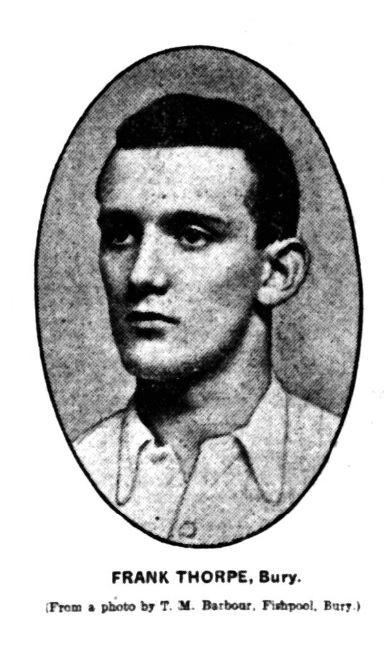
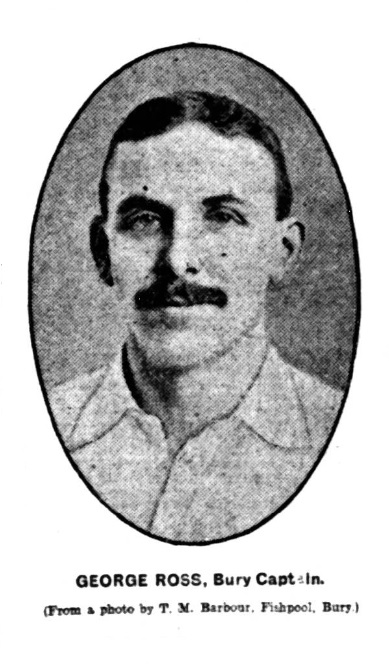
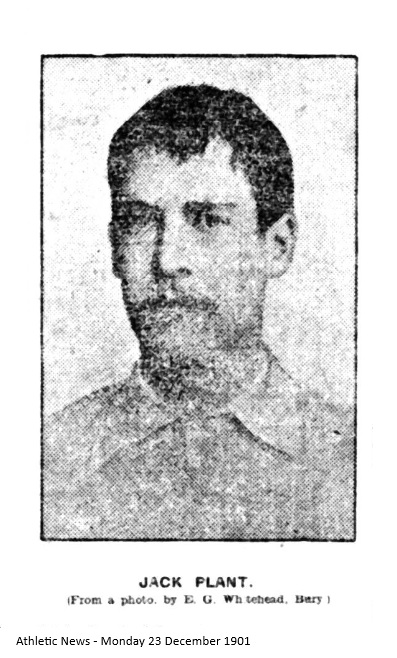
BURY BAG A BRACE AT LAST
Athletic News - Monday 17 February 1902
By Tittrus
Bury have been anxiously looking for another League victory since early in December, but the eagerly anticipated brace of points came their way on Saturday, when they defeated Everton by the bare majority of a single goal. Whenever I take a trip to Gigg-lane I see some football, and I am bound to say that is not always my experience to tour in search of sport. Moreover Bury are generally kind enough to perform some extraordinary goal-getting feat which quickens the pulse and stirs the blood. Now against Sunderland in October Albert Monks volleyed a goal which I thought was the most meritorious point I had seen this season. But on Saturday we had a very good counterfeit presentment of Monk’s goal, though the artist this time was Charles Sagar. The points were as like as two peas in a pod, and they brought the same result –two points for Bury. Thus the Lancashire eleven enjoyed the distinction of having defeated both the teams who are supposed to be exclusively battling for the Championship by the same margin, and on each occasion they have thoroughly earned their reward. At the same time, one cannot deny that Everton made Herculean efforts to divide the spoils and in the second half when they had only four forwards, for Settle retired injured at the interval, they played with a rare spirit. Several times the visitors nearly succeeded in equalizing, but the old proverb about a miss being as good as a mile applies to football as well as to other mundane matters.
THE STORY OF THE STRUGGLE
First of all let me compliment the Bury directorate on the state of their playing pitch. There was hardly a trace of snow to be seen, and considering the weather we have endured the enclosure was in remarkable conditions. But even the Bury executive could not take the “bone” out of the turf, and this, of course, hampered the freedom and firmness of movements. It was evidently difficulty to grip they surface and more than once players found themselves imitating acrobats with their “splits” Bury were without Richards and Everton were minus Taylor, but the teams gave a capital exhibition of legitimate League football. On the whole, Bury had the better of the opening play, and only twelve minutes had elapsed when they scored a lovely goal. Everton had enjoyed the advantage of a couple of free kicks, but they were gradually forced back and Frank Thorpe after a neat little dribble, shot out to the left wing. The ground was so fast that the ball often beat the player. It looked as if this would again be the case, although Plant was making his longest strides to overtake the leather. First we thought he would fail to reach the ball ere it bounded over the goal line near the corner flag. Then we fancied he would just manage to trap the ball. Yes, he did and he middle back somewhere in the vicinity of the 18 yards line. Thereupon Charles Sagar threw out one of his long spider-like legs and booked the ball into the corner of the goal where Kitchen was not. It was just like a bit of conjuring, and compensated the tall Turtonian for a grand effort which he had previously made without bearing fruit. Generally speaking, Bury played the better football, and Monks drove the ball swiftly just over the bar. Everton tried every device they knew to get on terms. The left wing was the more preserving, but bell and Settle realized that they had caught a Tartar in Johnston. Once, after a foul against McEwan, Bell was in a nice position to do the trick, but he missed his kick, although Young nearly atoned for his failure. Still, the interval arrived with Bury leading by a goal which they deserved. On turning out again Settle was a notable absentee, but despite this the visiting quartette showed splendid vim, and they were well supported by their half-backs. They were far more dangerous than in the first half; but even so, Bury had their share of the game. Both custodians had to be on the alert, and of the two Montgomery had the more difficult shots to parry. Twice John Bell wove his way into the shooting zone, but Montogomery proved invincible, although Proudfoot let the Bury goalkeeper off very lightly when he had a glorious chance. Yet at the other end Monks was quite as much at fault in failing to utilize one of Plant’s swinging centres. As I have said, Everton were very near drawing level, and once the Bury position had a lucky had a lucky escape; but all the same that goal by Sagar was worth many a dozen of commonplace points, and decided the issue.
CRITCIAL REMARKS
The game was well worth watching and I must say that the Bury eleven were endowed with vitality and a sprightliness which are a powerful factors in such a game as football. Moreover, considering that the Bury attack was quite experimental the forwards played excellently, for the wings were fast and clever. Tom Gray, who has appeared as inside right and inside left took the place of Richards as outside right. He was the best forward on the field. Maybe some of his passes were too square, but he took the ball in all positions, dribbled down the touch line, and centred time after time at all kinds of centred time after time, at all kinds of angles, in a most effective manner. He reminded me much of Tiddy Leighton, who was the outside left of Nottingham Forest years ago. Gray has the grit of speed, and a cunning craft tucked away in his toes. He is versatile and is evidently worth cultivating. The puzzle is to find his best position. Plant and Sagar maintained their reputation, and the latter is not only on the target, but he pushes the ball out to the wings, and has evidently a good conception of his duties. Of the middle line, Johnston stood out by himself both in attack and defence and the Bury half-backs are to my mind stronger than ever. Johnston was quite equal to John Bell and Settle, when the latter was on view, while Frank Thorpe if he did not reach the standard I am told that he attained against West Bromwich Albion, is a gem. When the ball is at his feet his eyes are swiftly taking in the situation, and he acts with judgement. The first time I saw Thorpe I said that he was another Frank Forman, and I know of no reason to withdraw that observation. Of course, George Ross was George Ross; enough said. The defence of Bury was able, Lindsay being notable for his solidity, and McEwan for his trickiness,. Everton showed excellent form, but still not their best. Neither Kitchen nor any other custodian could have repelled the fatal shot. Bert Sharp, and Balmer were not as reliable a pair as Lindsay and McEwan, and of the two I thought Sharp the smarter. Balmer is not kicking with power, and having attained a certain degree of excellence never seems to get beyond it. They best of the half-backs was Abbott, although the trio were not very convincing of their ability. The forwards were mediocre, but Proudfoot was energetic, Young tenacious and Bell flashed out at times to remind one of his old days. But Settle was off his game, and the side did better without him than with him. Young would improve his play if he tried to take the ball more sideways than directly facing his opponents’ goal, but he is certainly a promising centre. At times Sharp played well, and he made two grand shots in the second half, but it seemed to me as if he missed Jock Taylor. Taken altogether, it was not Everton’s day out, and Bury encouraged their supporters to look ahead with an increased measure of confidence. Bury; Montgomery; Lindsay and McEwan; Johnston, Thorpe, and Ross; Gray, Wood, Sagar, Monks, and Plant. Everton; Kitchen; Balmer, and Sharp; Woilstenholme, Booth, and Abbott; Sharp (J), Proudfoot, Young, Settle, and Bell. Referee; Mr. J.H. Strawson, Lincoln.
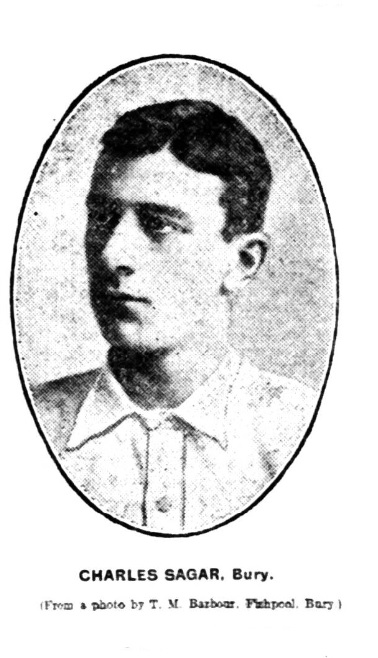

BURY 1 EVERTON 0
February 17 1902. The Liverpool Mercury
These aspirants to League and Cup-tie honours respectively met on Saturday to decide their return League fixture. Everton turned out five minutes late, but winning the toss, the game opened at a fairly brisk pace. The Everton right made some progress, but found in McEwan a steady defender and the ball rolled over the line. A free kick against Lindsay placed Everton in a good position, but Proudfoot misjudged the rebound and lost a good opening. The home left wing pair now put in a splendid combined movement, and after Plant had outwitted Wolstenholmes he sent the ball to Sagar, who scored with a magnificent rising shot into the corner of the net. This success came after play had been in progress ten minutes, and responding to the enthusiasm of the crowd the Bury players put in an extra effort, and were soon in dangerous proximity to the Everton goal. Wood again missed by a mere shave, while his partner contributed several fine centres, which were luckily got away. The Everton front rank were making off when Settle came under the ban of the referee, and following an injudicious pass from Proudfoot the home backs were enabled to place their forwards one again in a good position. Half time arrived with the Bury forwards pressing. Score Bury 1 goal Everton nil. Settle, who had been injured in the first half, did not turn out on the resumption and the Everton team was greatly handicapped. Still, the quartet of forwards shaped well, and a good movement led by Sharp, looked promising. Young, however, shot wide, but Proudfoot and Sharp again took up the attack, when McEwan came to rescure of the home side. Final Bury 1 goal Everton nil. Bury: - Montgomery, goal, Lindsay, and McEwan, backs, Johnson, Thorpe, and Ross, half-backs, Gray, Wood, Sagar, Monks (a), and Plant, forwards. Everton: - Kitche, goal, Balmer, and Sharp (b), backs, Wolsteholmes, Booth (captain), Abbott, half-backs, Sharp (j), Proudfoot, Young, Settle, and Settle, forwards. Referee Mr.J.H Strawson
EVERTON RESERVES 4 BURY RESERVES 0
February 17 1902. The Liverpool Mercury
Lancashire Combination
At Goodison Park. The ground was covered by a couple of inches of snow. The Everton team displayed very fine form in the first half, and adapting, themselves to the conditions much better then their visitors, had considerably the better of the game. Bones scored the first gaol, after about an quarter of an hour's play, and before the interval Chadwick Paterson and Bowman put on further points. At the interval Everton led by four goals to nil. Bury shaped much better in the second half, which was unproductive although both Thompson and Muir were frequently tested, and Everton eventually winning by four goals to nil.
Everton: - Muir, goal, Watson, and Gillespie, backs, Boyle (captain), Clark, and Brown, half-backs, Rankin, Bowman, Proudfoot, Bone, and Singleton forwards.
EVERTON REVIEW
February 17 1902. The Liverpool Mercury
Had Everton won at Bury on Saturday, it would have materially intensified the interest in the struggle for this season's championship of the League, more especially as the Wearsideres lost a valuable couple of points to Notts Forest. Both clubs are still in the same position, Sunderland having four points in hand over Everton; and seeing that the present leaders have yet to visit Goodison Park, a victory at Bury would have given the Evertonians a splendid chance of drawing level with the Northern team. Saturday's game fluctuated considerably, and while on the one hand the Bury eleven were more consistent in their movements Everton had chances opened out which, had they been accepted, would have placed the issue in their favour beyond doubt. Early on Proudfoot allowed a couple of fairly good openings to pass unheeded; while towards the end of the game the sides were not blessed with luck, as a fine shot from Young was saved by excellent goalkeeping, and another from Abbott, at terrific pace, was unfortunately charged down by the Everton centre at a juncture when Montgomery was practically helpless. Still though the issue might have resulted favourably to Everton, the visitors could not claim to have been the superior side. The Bury forwards were more methodical in their movements, and had they not suffered from the usual fault of shooting direct at the keeper, most have had a more substantial lead. Kitchen played a grand game, and under the conditions could not have been blamed if his charge had been penetrated more frequently. His flying kicks were a feature, of his display, and the accuracy with which he timed them stamped him as one of the most resourceful of custodians. One save in particular from Monks at a close range was a great effort, and all round he covered himself with honours. None the less effective were the endeavors of the backs to keep their strong opponents at bay. They tackled and cleared in masterly fashion, and were seen at their best when hard pressed. More than once Balmer lifted the ball out of the goalmouth, when scoring was imminent, and B.Sharp improved considerably upon previous performances. The trio formed a capital defence, and the Bury crowd warmly appreciated their exertions. The half backs had plenty of work on hand with the lively Bury forwards, and while Booth and Wolstenholmes were mainly engaged in breaking up the combination of the home forwards, Abbott was noticeable with some well-directed attempts to score, two of which under ordinary conditions would certainly have found the net. The forwards were uneven especially in the first half, when several chances were allowed to go a begging. There was not that crisp movements and smart passing in which they have proved themselves capable exponents, and much of what looked like producing a tangible points was more the outcome of individual than combined effort. Bell dropped in several fine centres and on one occasions must himself have scored had he not shown signs of distress as the results of his recently injured arm. In the second half of the game that van had evidently recovered themselves, for they were seen quite a different guise, and had Leaks them able to resume the result might have been quite a different complexion. The inside left had collided with Lindsay in the first portion of the game, and was not able to turn out after breathing space, and this was most unfortunate fir the visiting side, as the quartet were quite holding their own. Still, taking the game all though, Bury played the better football and deserved their lead, but there will need to be a big improvement if they are to get the better of Southampton on Saturday next. They sent in numerous shots, many of which, were besides the mark, and probably this was due to the unsteadying influence attendant upon the state of the ground. Under favourable conditions one could imagine them a most powerful side, and the forwards back up, by a clever trio of halves, should surely vex the stoutest of defenders. It was a fine shot with which Sagar defeated Kitchen, and the extreme outside men know exactly where and when to centre the ball. Johnson played a clever half-backs games as no doubt Bell and Settle would simply testify, and in Thorpe the club are fortunate in possessing a capable centre half on the youthful side. Ross like Abbott, was prominent with some clever shots, and in all the Bury, half-backs line proved, themselves a powerful force to contend with. The backs Lindsay and McEwan played a sturdy, fearless game, and, by way of a charge, Montgomery was above adverse criticism. He kept out a couple of warm shots in clever fashion, and no doubt his improved display will restore him again to popular favour.
BURY v EVERTON
Liverpool Daily Post - Monday 17 February 1902
At Bury, in favourable weather, before about 10.000 spectators. Settle reappeared in the Everton ranks, the club being fully represented. Bury started play, and a rundownby Proudfoot and Sharp found occupation for Ross and McEwen, who repulsed the invasion. Then Bury gradually improved their position, and for two or three minutes were exceedingly busy in front of Everton’s goal. Everton now had more of the game, and the home defenders had some difficulty in keeping them at arm’s length. Play had been in progress thirteen minutes when Plant and Monks burst through, and Plant, centreing well from the goal-line to Sagar, that player got his foot to the ball, and sent through at the top cornerof the net. Bell, on the restart, dashed up the wing, centreing to Settle again, who shot- through a forest of legs in front of goal. The ball struck McEwen, and only went an inch wide of the post. Everton continued to have hard luck up to the interval. Half time:—Bury 1. Everton nil.
On restarting Settle failed to turn out. Everton got away nicely, and matters were warm for the Bury defenders for the next few minutes. Plant passed Monks, but the cross shot was reached Kitchen, who thus saved a certain goal, as Wood was waiting at the far corner. A quick incursion to Bury’s end saw Proudfoot make a grand attempt. Montgomery clearing finely. A corner fell to Everton, and Abbott sent in, but his shot rebounded off several players. Again Abbott shot with accuracy, and Montgomery effected a brilliant save. Everton had all the best of the play, and were very unfortunate in not scoring. Result: Bury 1 goal, Everton nil.
EVERTON TO PLAY AT NORTHWICH
Bognor Regis Observer - Wednesday 19 February 1902
Much satisfaction was felt at Northwich on the receipt by Mr. Cowley, the council clerk, of a letter from the secretary of the Everton Football Club, intimating that their League team will visit Northwich and play a match against a team representative of Mid-Cheshire. The proceeds will be devoted to the fund for the extension of the Victoria Infirmary, Northwich. This is a Mid-Cheshire memorial to the late Queen Victoria, and will cost £4,000. About £1,700 has already been raised.
PLAYERS ON TRANSFER LIST
Nottingham Evening Post - Saturday 22 February 1902
Everton have put Muir (goalkeeper), Watson (left back), Worthington (centre forward), Paterson (inside right), and Roche (outside right) on the transfer list.
TODAY TEAM NEWS
Liverpool Daily Post - Saturday 22 February 1902
Everton v Blackburn Rovers at Goodison Park, Kick-off 3.30
Everton;- Kitchen, goal; Balmer and Sharp, backs; Wolstenholme, Booth and Abbott, half-backs; Sharp, Taylor, Young, Settle, and bell, forwards. Reserve; Rankin, Bone, and Singleton.
Everton Combination v Blackburn Rovers Reserves, at Blackburn; kick-ff 3.
Everton.- Muir, goal; Watson and Eccles, backs; Boyle, Clarke, and Blythe, half-backs; Rankin, Paterson, Bowman, Bone, and Chadwick, forwards.
EVERTON v BLACKBURN ROVERS
The Liverpool Football Echo- Saturday, February 22 1902
DEWHURST OPENS THE SCORE FOR THE ROVERS
SOMERS SCORES A SECOND
By Pigeon Post and Telephone
The victorious career of the Evertonians has received a several check latterly, especially after their inglorious visit to Bury last week when they ingeniously failed to reap even such a bare harvest as their Liverpool brethren who had preceded them. The Rovers turned out in full strength, but the home left wing pair, Settle and Bell, were absent through injuries and their places were filled by the promising understudies Bone and Chadwick. Teams;- Everton.- Kitchen, goal; Balmer and B. Sharp, backs; Wolstenholme, Booth (Captain) and Abbott, half-backs; Sharp, Taylor, Young, Bone, and Chadwick, forwards. Blackburn Rovers.- McIver, goal; Crompton and Darroch, backs; Howarth, McClure, and Houlker, half-backs; Whittaker, Somers, Newhurst, Morgan, and Blackburn, forwards.
(Unfortunately the rest of the report is completely unreadable copy on page 3-carried on from page 4 of the Football Echo)
Shortly after their reverse, the Evertonians became more systematic in their methods, and by means of good work in the Rovers’ quarters one of the recruits-Bone-very soon distinguished himself by a rattling shot, which the Rovers’ goalkeeper managed to twist round the post. The corner came to nothing, but the next moment the home right wing went down in fine style, and Sharp drove the ball by the side of the post. The next attack came from the centre. Young dashing in at the finish, and nearly dumb founding McIver with a shot which brought him to his knees; and a further onslaught was mulled by a misunderstanding between the home forwards when close to goal. Then followed some skilful manoeuvring by Booth, Young, and his left wing. It was very pretty to watch, and the Blues looked like being successful, ultimately, however, Crompton found an opening and gave Whittaker possession. The Rovers made the most other chances, and, playing with great earnestness, pressed their attack so close home that Kitchen fisted over from Dewhurst. The visitors declined to take their departure, and after the lapse of a minutes McClure struck the goalpost with a truly rasping shot Kitchen was fairly beaten and had a marvellous escape. A barren corner having fallen to the Rovers, a foul against Chadwick gave them a further opening, but the home side got the upper hand, and the right wingers went down strongly, only to miss chances when the pinch came. They succeeded in bustling a corner from Darroch, and when the leather was put away Bert Sharp served up to his brother, the latter dropping a beautiful shot to McIver, who was playing marvellously well, and succeeded in clearing. Quite am exciting spell of play followed close to the Rovers’ goal, but, although at least four or five shots were sent in, the home contingent could not find the net, and they were beaten back for a while, but the Rovers failed to anything great Everton were making desperate efforts to equalise as the interval drew nigh, but though the individual work was brilliant in the extreme, the machinery was not working well as a whole. Time after time the Everton forwards were practically on top of McIver and the ball was popped to them from an quarters, but they could never see it at the right moment or get their toe to it, and as Darroch, Crompton, and McClure were always on the leather like lightning. Everton’s efforts were distinctly neutralised. Then came the softest goal on record and disaster for the Blues. Somers and Whittaker, who had all along played with great spirit, took the leather up, and they were soon in front of Kitchen, who received a very mild shot at close quarters from Somers. There was no sting in it, but Kitchen, who was stooping down, let it roll through his legs and hands and the Rovers were two goals up both of which had practically been given to them. Half-time; Rovers 2 goals, Everton nil.
Final Result Blackburn Rovers 2 goal, Everton nil.
BLACKBURN ROVERS RES v EVERTON COMBIANTION
Played at Blackburn. Half-time Rovers Reserves 1 goal, Everton nil.
Final; Rovers Reserve 3 goals, Everton 1 goal.
EVERTON v BLACKBURN ROVERS
Lancashire Evening Post - Saturday 22 February 1902
By Rover
The Rovers travelled to Liverpool this morning with the full knowledge that if they could but avoid defeat their chance of retrieving their overthrow in the Cup competition by finishing among the first three clubs in the League table would be golden. The decisive thrashing Crompton and his men administered to Stoke repaired the rudely-shaken public confidence in the prowess of the Rovers side, and it was felt that if the Rovers could win at Goodison Park in the Lancashire Cup semi-final, they could, provided they developed their best form, beat Tom Booth’s talented side to-day. Blackburn folks had just one fear-that Darroch might perchance prove shaky against such a flyer as John Sharp in view of the ex-Bury back’s bad form against Derby. Teams;-
Rovers;- McIver, goal; Crompton (Captain) and Darroch, backs; Howarth, McClure and Houlker, half-backs; Whittaker, Somers, Dewhurst, Morgan, and Blackburn, forwards.
Everton.- Kitchen, goal; Balmer and B. Sharp, backs; Wolstenholme, Booth (Captain), and Abbott, half-backs; J. Sharp, Taylor, Young, Bone, and Chadwick, forwards.
The Rovers had a big reception from 500 excursionists. At 3.30 Mr. Kirkham, Preston, signalled, and Crompton, winning the toss, Young opened before 10,000 people, but the crowd was rapidly increasing. Crompton cleared from McClure’s early foul, and Somers and Whittaker went away in brilliant style well in the Everton half. Somers passed to Morgan, who, with admirable foresight, lifted the sphere over Balmer’s head, Blackburn dashing in, and forcing a corner. Balmer got the ball away, but Jack Sharp fouled Darroch badly, and the Everton backs stayed with difficulty another heavy rush. The Everton left wing now delighted the crowd by pretty work, but Chadwick shot low and wide, amid a roar of chagrin. Backed by Tom Booth, the home forwards fell into line, and made terrific onslaught. Had not Crompton kept cool the Rovers colours must surely have fallen. A dozen volleys were beaten out of the goalmouth, and a great centre from Sharp was cleared by little McIvor with admirable pluck, Booth fouled, and a swift, headlong dash by Dewhurst and his wings carried the ball well into the home quarters. The Crowd roared with excitement while Balmer and Sharp desperately tackled a swarm of Blue and Whites, but Blackburn eventually placed behind in attempting a difficult screw into the centre. Play grew terribly fast, and Blamer cleared grandly. Darroch was playing well, and the style in which he twice beat back. Sharp and Taylor was admirable. The Rovers’ left wing pair, well fed, were playing with infinite zest. Blackburn got through a group of opponents near the Everton flag, and giving to Morgan, that player centred hard and low. The Rovers made a big rush, but Bert Sharp cleared finely. After 15 minutes the Rovers came through at great speed on the right, and as the ball came into the centre Dewhurst pushed through and shouldering off Kitchen, who ran out, with a heave of his badly shoulders, volleyed dead into the net, amidst a storm of cheers and loud braying from an amateur bugler. Play was resumed at greater speed than ever, and after Balmer had only reached a fine drive from Whittaker by herculean efforts, Jack Sharp made a grand dash. He sprinted like a deer to the Rovers’ flag, and shot magnificently all along the carpet from 0 yards. McIver flung himself across the goal, and clutching the ball braved a stern rush, and finally effected a magnificent save. The Everton men made superhuman efforts to equaliser, and twice were only beaten back when on the threshold of McIver’s charge. Inspired by Crompton’s smartness, the Rovers’ forwards worked like trojans, missing repeatedly by inches. The Everton men attacked grandly but the defence was too good. Five minutes form the interval Somers scored, Kitchen mulling. Half-time- Rovers 2, Everton 0
So far the Rovers had proved the better side in a splendid battle. Play reopened before 14,000. The turf was very greasy, and as there was a lot of heavy charging the players were well bespattered with mud. Morgan sent Blackburn away with a pretty pass. Though Balmer robbed the international, Somers got hold, and from his dexterous pass, Whittaker dashed past Sharp and whipped the sphere high into goal. A group of players clean missed the ball in the mad goalmouth rush, and Balckburn had a golden opening, but hesitated and was lost. Morgan quickly recovered from an injury and fine opening forward work by Young and his wings put the Rovers’ citadel in dire peril, but Crompton once again came to the rescue, the Evertonians showing no anxiety to tackle the skipper. Sharp was getting away nicely when Blackburn knocked him head over heels over the touch line with a fair but terrific shoulder charge. Booth was conspicuous for clever and dashing work. Somers brought the Rovers away with a clever solo dribble, but Whittaker, when seeming to be racing through, kicked over the touch line. Everton were persistent, but Darroch returned Booth’s shot grandly, and there was little devil in the play of the home forwards. A great cheer hailed the Everton right wing as it came clean through the Rovers’ defence, but Taylor’s shot was far too high. Crompton bowled Chadwick over near goal, Mr. Kirkham paying no heed to a penalty claim. Morgan was playing one of his finest games since taking to the Rovers’ colours. On the other wing Whittaker all but broke clean through following beautiful work by Somers. At the finish the Rovers were pressing hotly.
Result- Rovers 2 Everton 0.
ROVERS RESERVE v EVERTON RESERVE
Lancashire Evening Post - Saturday 22 February 1902
At Ewood, before a moderate attendance. The outstanding feature of the first 20 minutes was the splendid aggressive tactics of the visitors, who banged in shot after shot in the most approved style and an equally fine exhibition of Coupe, the Blackburn custodian, who cleared his lines in a manner that elicited warm applause. Now and again the Rovers’ quintette displayed their paces, but at this time their efforts were mediocre compared with those of their opponents. Despite their undoubted cleverness, the Toffee men found Eastham and Hardy had carefully studied the art of defence. Hence, their promising attacks went “aft agley.” Bryant, sprinting grandly, made a meritorious attempt to inscribe the figure one on the clean slate, but he was grassed at the critical moment, and it was left to his partner, Hoyne, to open the Rovers’ account with a goal which had been well earned by the activity of the forward line, who were now exhibiting improved form. Everton experienced hard lines on several occasions, but failed to get through. Half-time- Rovers’ Reserve 1, Everton Reserve 0.
On resuming Everton strove valiantly for an equalising point, but the defence, which was hard pressed, held them at bay.Parsonage, the right half, claiming a fair share of the honour that attached to this achievement. The Rovers’ forwards individually displayed any amount of energy, but spoiled promising openings by indifferent combination. The visitors, a speedy lot, were ever ready to pounce on the ball, and as a result of one of their vigorous attacks, Roche easily beat Coupe. Responding to the cry of their supporters the Blue and White transferred operations to the other end, an a terrific cheer rent the air when Hoyne, who had skilfully dodged the backs, registered a grand goal. A few minutes later the enthusiasm was unbounded when Gate shot hard and true into the net. Everton made abortive attempts to reduce the lead, but to the end the Rovers held the upper hand. Result- Rovers Reserve 3, Everton Reserve 1.
NORTH v. SOUTH
Yorkshire Post and Leeds Intelligencer - Monday 24 February 1902
For to-day's match at the Crystal Palace, several changes have become necessary on the North side. Needham, Bloomer, and Lipsham are unable to play owing to the undecided Cup-ties, and Settle is also an absentee. Their places will be taken Abbott (Everton). Simmons (West Bromwich Albion). Wooldridge (Wolverhampton Wanderers), and Blackburn (Blackburn Rovers) respectively. the South team the absentees are A. Chadwick, G. O. Smith, and J. Turner. These vacancies will filled W. Smith (Oxford City) E. Booker (Cambridge University), and B. O. Corbet t (Corinthians) respectively.
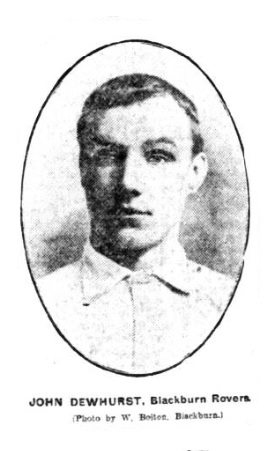
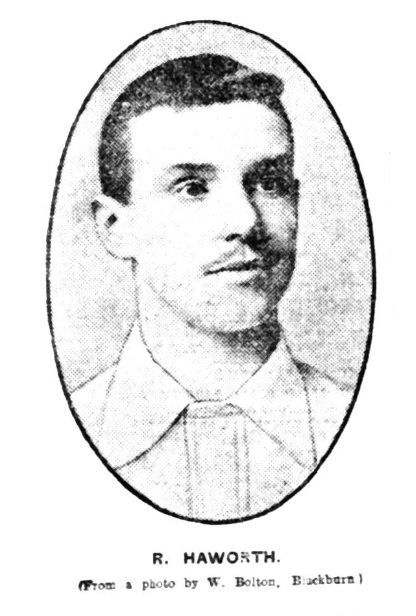
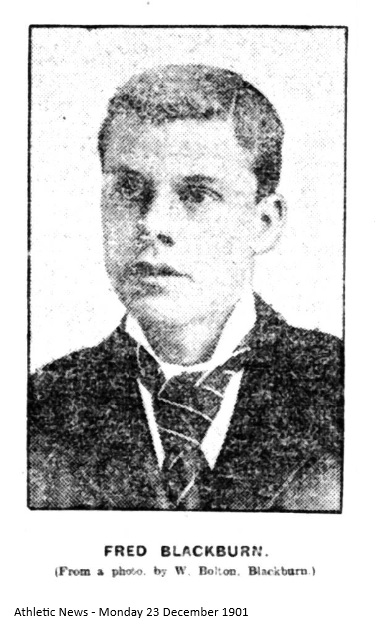
EVERTON ROUTED BY THE ROVERS.
Athletic News - Monday 24 February 1902
By Junius
Whatever prospects Everton ever had of the League championship were effectively dispelled by the defeat at the hands of the Rovers of Blackburn. Only once before this season had Everton been overcome at Goodison Park in a League match, this being on Christmas Day, when Aston Villa with ten men shocked their feelings. The display of the Rovers merited two goals, which very fairly represented their superiority over their more fancied rivals. The winners were represented by the team that during the past two months had distinguished itself by a sequence of smart triumphant, but Everton played their reserve left wing in place of Settle and Bell.
AN INTERESTING HALF.
With the in breeze their favour the Rovers were quickly aggressive in the opening moiety, and early gave evidence of their intentions. True, Chadwick and Abbott had tremendous shots luckily charged down in the visitors’ goal month, but on the general play the Rovers were more dangerous, and Kitchen was twice keenly tested by Morgan. They were remarkably keen on the ball, and kept the Everton defence fully employed. Their first goal, however, was only obtained after Young had dallied with a neat pass near goal until his shot was charred down, and the ball coming out to Whittaker, the latter set off at a rare pace along the touch-line. Beating the backs he centred early, and the leather came to Balmer, who was tackled by Dewhurst. The Rovers’ centre got the better of the home back, and though Kitchen dashed out to clear. Dewhurst regained possession and gave his side the lead. The tricky outside right followed this up with another lively sprint and centre, and after a tussle near the posts the home goal narrowly at the expense of a corner. The Everton forward could not get properly going, but at length Sharp put in a beautiful centre, and Young receiving, tapped the ball to Bone, who drove low down towards the right hand corner of the net, but Mclvor sprawled full length and tipped the sphere behind. Another long rising shot from Young was well kept out, and the Rovers gained ultimate relief by a couple of free kicks. From the second Dewhurst broke clean away, but Kitchen saved wonderfully well, though a moment later a terrific shot from McClure hit the upright when a goal appeared a certainty. Realizing their position, Everton put on pressure at this juncture, but the Rovers backs defended splendidly, and McIvor performed many valiant feats between the posts. Just when the bombardment appeared likely to take effect, Dewhurst got clean away from a long return by one of the backs, and dribbling ahead he reached the penalty line before transferring to Somers, who sent in a slow ground shot. Kitchen stopped the ball easily enough, but to the utter discomfiture of his comrades, and the intense delight of his opponents, let it slip, and the leather rolled into the net. Goal number
AFTER THE IINTERVAL
It was felt that nothing short of a miracle could avert for Everton the threatening disaster. The subsequently play did not diminish this presentiment, for the Rovers at times played all over their opponents. Several chances were spoiled by the home forwards dallying, but the left-wing was of little use in this period, though Bone sent in the best of the shot of the afternoon, but Mclvor was in his happiest vein. As time progressed, the visitors became more and more prominent, and Dewhurst scored only to be adjudged off-side. Blackburn whipped in a lovely shot that Kitchen did well to get rid of, and the fleet-footed Whittaker was ever troubling the defence with his runs and centres. A beautiful low drive from him just skimmed the bar, and just to demonstrate the inefficiency of the Everton front rank near goal, the Rovers custodian was called B. Sharp, who dashed up, and from sheer aggravation presumably flashed the leather bang at Mclvor, who was almost beaten. But the famous Rovers easily held their own, and had the felicity of securing a well-won victory by two clear goals.
EVERTON EXTINGUSIHED
In a race for the ball it was long odds on a Rover obtaining possession no matter from what position he was placed, favourable or otherwise, and the consequence was that Everton were practically playing a losing game throughout. Then, in front of goal, there considerable weakness shown, and many openings were lost through hesitation in shooting. The left wing, composed of Chadwick and Bone, had little chance with Haworth and Crompton, and with one its wings clipped the home attack was seriously hampered. Young could not get his men going, but, apart from this, there was the lack of dash and spirit which might have made openings, but which were allowed to pass unheeded, and the position placed in the Rovers' hands when a little extra determination would have gained for them a favourable footing, with a probable chance of testing Mclvor at more frequent intervals. The halves were best represented by Booth, but here again the methods were heavy and Cumbersome, and the sprightly crickets on the Rovers extreme forward line were always bobbing about their feet and giving them no rest. Balmer made one huge mistake and a number of smaller ones, and was by no means up to his best form, but Sharp kicked very cleanly and forcibly. Kitchen’s blunder has already been referred to, but he made some gallant saves, and his one mistake was surprising to everyone.
ROVERS RAMPANT
THE Rovers simply excelled themselves in every department, and a more determined, dangerous and dashing set of players has rarely been seen at Goodison Park. The men were full of life and vigour always on the ball, never beaten, and making the utmost of every chance that cropped up. The forward were a grand set. Whittaker and Blackburn sprinting in the heavy turf as if they were on a specially prepared cinder track. The old Liverpool players, Morgan, gave a capital display. Dewhurst was a hard-working leader, and in fact all along the line there was not a shirker, not a laggard amongst them, and when they got near goal, didn’t they let go. Their attack was just of the sort that is bound to prove successful, full of energy and working harmoniously from one extremely of the line to the other. The passing was brisk and the ball flashed from wing to wing with commendable accuracy, whilst the men never considered themselves beaten. The halves were imbued with the same spirit, botting up the home forwards by their extra dash, and being most aggressive on their tactics. Crompton gave an excellent display at full-back, his kicking being one of the features of the game, and McIvor in goal was invincible. Everton; Kitchen; Balmer, and Bert sharp; Wolstenholme, Booth and Abbott; J. Sharp, Taylor, Young, Bone, and Chadwick. Blackburn Rovers; McIvor; Crompton, and Darroch; Haworth, McClure and Houlker; Whittaker, Somers, Dewhurst, Morgan, and Blackburn. Referee; Mr. F. Kirkham, Preston.
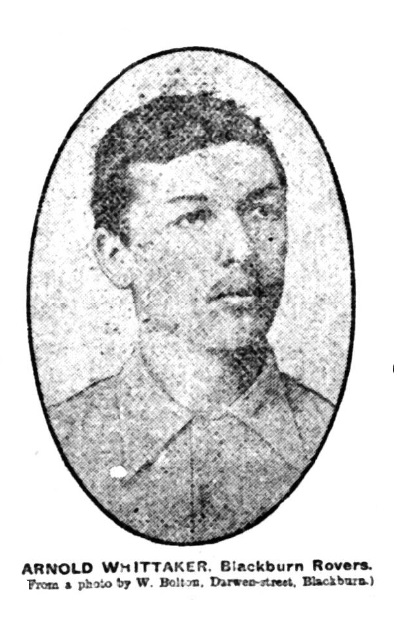
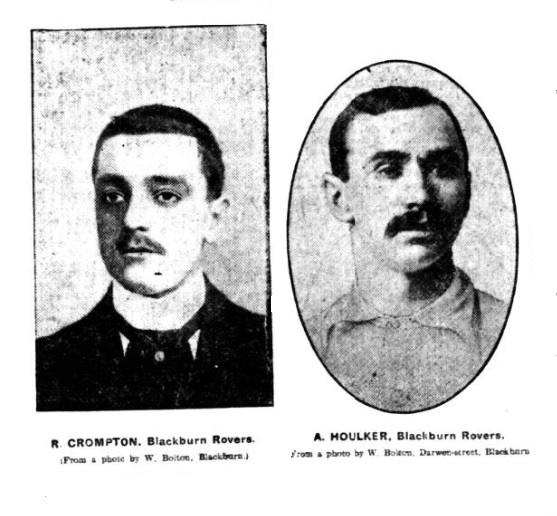
LIVERPOOL AND DISTRICT NOTES
Athletic News - Monday 24 February 1902
EVERTON’S DEFEAT.
By Junius
The reverse sustained by Everton at home -their second of the season at Goodison Park-practically destroys all chance of their obtaining the championship of the league. Of course there was never a great possibility of this honour being secured, though up to Iast Saturday, and prior to the defeat at Bury, there were optimists who considered that the Goodison Park brigade held more than an outside chance. These illusions have now been dispelled, and there will have to be a wondrous upheaval in form if Everton are to finish even second in the table. The policy of trying the reserve left wing against the Rovers was not successful, for this pair were too slow to take advantage of the openings afforded and made a poor show against Crompton. But there was never any likelihood of Settle and Bell playing in this match, and the fact that they were forwarded as part of the side to oppose the Rovers, in the officially selected team, is one those things that no fellah can understand. But the players as a whole were too slow to beat the Ewood Park eleven, and the visitors gave an exhilarating exhibition, one which both the Anfield and Everton teams would do well copy. There was no attempt to simulate a classy combination, but they produced the same results, and amply proved that an individually inferior eleven can by determination and whole-hearted endeavour accomplish what their more highly placed brethren cannot achieve. Verb. sap.
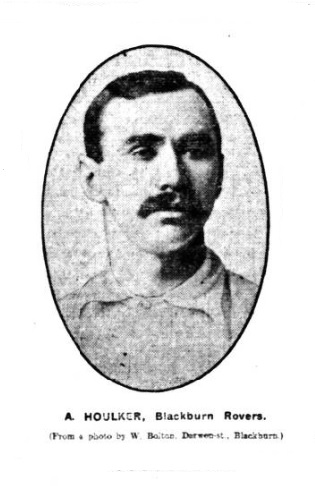
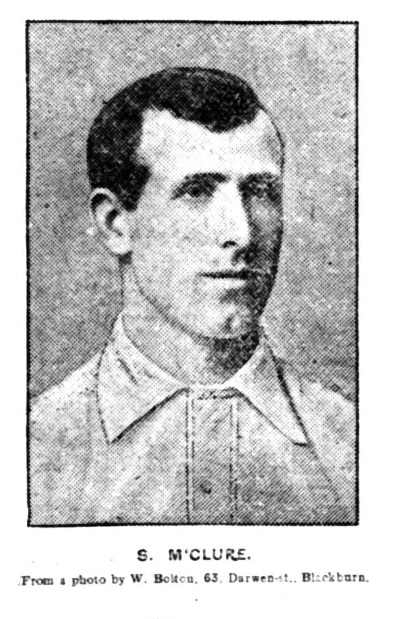
EVERTON 0 BLACKBURN ROVERS 2
February 24 1902. The Liverpool Courier
The return League match between Everton and Blackburn Rovers was played at Goodison park on Saturday in weather of the most uninviting description. Everton: - Kitchen, goal, Balmer, and Sharp (b), backs, Wolstenholmes, Booth (captain), and Abbott, half-backs, Sharp (j), Taylor, Young, Bone, and Chadwick (j), forwards. Blackburn Rovers: - McIver, goal, Crompton (captain), and Darroch, backs, Howarth, McClure, and Houlker half-back, Whittaker, Somers, Dewhurst, Morgan, and Blackburn (f) forwards. Referee, Mr.F.Kirkham. Crompton won the toss, and the Rovers had the advantage of the wind. Young started in the presence of some 10,000 spectators, and a free kick at once fell to Everton. The ball was well placed, but Crompton relieved, and the visiting left wing became prominent. Blackburn forcing a corner off, Balmer, which came to nothing. The ball went out of play two or three times, but for all that the play was interesting, and exciting with the visitors holding the advantage. Balmer dallied rather too long, and in trying to recover possession was knocked over by Dewhurst. The ball, however, was safely got away, and in further play each side was penalised for foul play. From a free kick, Everton made headway, and Chadwick shot just outside. The attack was maintained and for some moments the Rovers goal was in great jeopardy. First Chadwick banged in a free shot, and this was followed by another stinging effort on the part of Abbott. Unfortunately for the Evertonians on each occasions there was a Blackburn man in the way. Still this clever exhibition on the part of the home attack particularly the left wing, aroused the enthusiasm of the crowd. For some time the ball was kept in the visitors half, and a dangerous middle by J.Sharp was only negotiated with difficulty. A foul against Taylor transferred play to the other end, where Bert Sharp intercepted in the nick of time, a long shot from Houlker. A corner fell to the visitors, but the defenders could not be caught napping. After midfield play, the Rovers became very aggressive and Morgan put in a beautiful shot, which Kitchen cleared, in his best style. For some time the visitors kept the Everton defence very busy, and once Kitchen took a flying kick at a shot from Morgan with satisfactory result. Then Jack Sharp had a dash down the wing, but was too closely attended by Darroch, and in twinkling, play was transferred to the other end. Whittaker got in a nice centre, which Balmer ought to have intercepted, but he missed the ball, Kitchen ran out to met the leather, but meanwhile Dewhurst had pounced upon it, and safely landed it in the net. This success after twenty minutes, inspired, the visitors, who looked like adding another goal to their record. Kitchen however, intercepted a capital attempt by Whittaker. Following this the Everton men were applauded for a gallant attack, which deserved an equalising goal. Young headed a centre from Jack Sharp to, Bone, who put in a swift low shot, which brought McIver to his knee. Somehow the goalkeeper managed to scoop the ball away, though he seemed to be almost on the line. A moment later Young called upon the Rovers custodian with an unexpected shot from long range. Still keeping up the pressure, the Everton forwards made matters warm for the Rovers defencers, and on one occasion Taylor was unlucky when within short range of goal. At last the home team was driven back, and from a free kick, well taken by Darroch; Kitchen saved grandly from Dewhurst, at the expense of a corner. So far the Rovers had proved themselves the smarter team. Balmer was penalised for jumping, and from the free kick, the ball was banged hard against the post. Following this, J.Sharp led a terrific onslaught, in which, all the forwards participated, but the defence prevailed, although McIver was called upon to deal with a dangerous shot from Bert Sharp. The Rovers paid a brief visit to the other end, and than Jack Sharp and Taylor took the ball down splendidly, resulting in Taylor shooting at McIver, who saved at the expense of a corner, which was only got away with great difficulty. Everton kept up the pressure for a considerable time without success, and then, from a breakaway Somers, registered a second goal for the visitors. Half time Everton nil, Blackburn Rovers 2.
In the second half the first aggressive movements came from the visiting left wing, but just as they were becoming dangerous they were pulled up for a foul. The home left wing retaliated, Chadwick being responsible for smart work. The play was not very interesting until Whittaker made off on his own account and banged in a centre which Blackburn might have easily have converted. The game was delayed for a while owing to Morgan being winded. Jack Sharp got in a couple of centres during the brief period that Morgan was being attended to by his trainer, but the Rovers defence prevailed, both backs indulging in vigorous kicking. There was however, a lack of method in the work of the Everton front line, and play was just now a very scrambling order. Booth gave a capital opening to Jack Sharp, who, however, missed a glorious chance of reducing the Rovers lead, and a moment later the same player was again at fault. The Rovers removed play to the other end without becoming dangerous, and Houlkes being penalised for pushing Young. Everton as the outcome of a few free kicks were once more acting on the aggressive. So vigilant however, were the visiting defenders that the home forwards were never allowed to trouble McIver, and when they did have a chance the ball was sent anywhere but in the direction of the goalkeeper. Kitchen had to meet a high dropping shot from Blackburn, and following a free kick the Everton custodian only just managed to clear at the expense of a corner. There were loud criers of “Play up, Everton” but the Everton men found their opponents a hard to nut to crack. To the finish the Rovers had the best of the play, and gained a well-deserved victory. Final; Blackburn Rovers 2 goals, Everton nil.
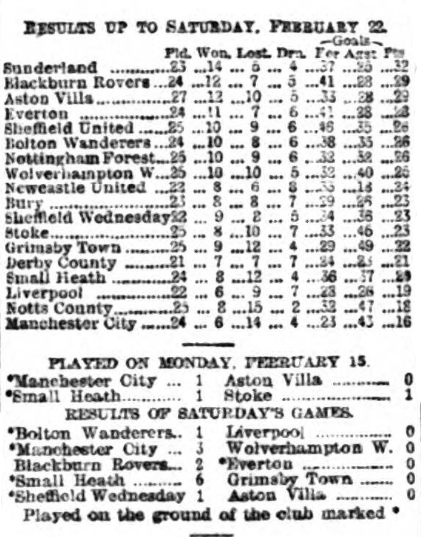
BLACKBURN ROVERS RESERVES 3 EVERTON RESERVES 1
February 24 1902. The Liverpool Mercury
Lancashire Combination. (Game 23)
At Blackburn. Everton had the best of the opening exchanges. Coupe having to save several times, and Roche putting in some good shots, the Rovers right made several attempts to get away, but Watson relieved. Singleton sprinting down the left, gave Coupe a handful but slippery ground spoilt play. The home team had a turn, and scored, leading at the interval by a goal to nil. From a goal from Hoyne. Resuming Everton were quickly on the ball, and Roche equalised. The Rovers however, played up vigorously and Abbott and Hoyne added goals and Blackburn winning by 3 goals to nil.
Everton: - Muir, goal, Watson, and Balner (r), backs, Boyle (captain), Clark, and Blythe, half-backs, Makepeace, Paterson, Bowman, not-Known, and Singleton, forwards.
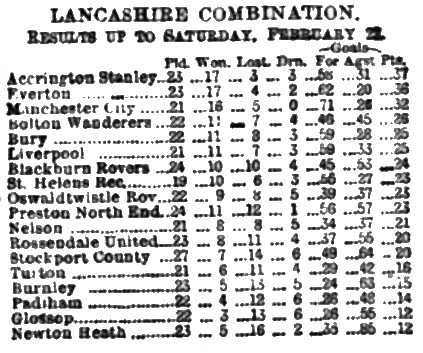
EVERTON REVIEW
February 24 1902. The Liverpool Mercury
For the second time this season Everton were beaten in a League match, and at the same time suffered their third defeat at the hands of Blackburn Rovers. At Ewood Park, in the first meeting of the clubs, Everton were overthrown by 3 goals to nil, and the later were ousted from the Lancashire Cup by the same opponents in the second round at Goodison Park. There was some reason therefore, for anticipating Saturday's reverse; but such a decisive adverse verdict of two clear goals was never bargained for, and one direct result of the drubbing is to practically put Everton completely out of the running for the League championship. That the Rovers were the superior team cannot be denied, and at times they completely overplayed the home side, and during these periods the latter were made to appear a very ordinary combination. The cause of the defeat was palpable for whereas on one side dash and determination were witnessed, in the Everton ranks the movements were comparatively sluggish, and many favourable openings were rendered abortive simply because the Rovers were on the rivals before the latter could realize their position. The visiting halves never gave the Everton front rank a moment's respite, nipping in and intercepting their passing, harassing them when in possession, and keeping their own attack continually on the aggressive. In every department the Rovers could claim an advantage, and they gave no sign of weakness either fore or aft. On the other hand, Everton were decidently feeble in attack, which lacked sting, and it was only at rare intervals that any combination between the members of the front line was demonstrated. Of course much of this inefficiency was due to the persistent attention of the Rovers half back division, but apart from this they made little headway when they had the ball to themselves, and had they infused as much energy into their play as their visitors did they would most probably have averted the defeat. The reserves left wing pair did not fulfil expectations, and their laboured efforts were easily broken up and shattered by the keen incisive work of the opposing defencers. They shaped well at times and Bone put in a couple of fine shots, but like the rest of the teams, they lacked determination and goaheadedness, and in the majority of instances when the ball was placed to them they were robbed by an impulsive Rover what time they were hesitating as to the course to be pursed. At one period Abbott twice put them in possession, only to find the visitors right half despoil them, and out of cheer desperation the Everton half-backs flashed the ball to the other extremity of the line, as if disguisted with his attempts to set them going. But the forward line was very faulty throughout, and scoring goals was not their forte. The Rovers attack was of a character that would seriously endanger the most stubborn defence. There was no hesitation about their methods; when a forward got the ball he shaped as if he meant danger, and was well supported by his comrades in case of emergency. Every man was on the alert for the pass, and when it came away he darted, with the rest of the line in attendance; the ball was sent from right to left, and back again with long swinging passes, and whoever, received the final chance flashed the leather into the goal with commendable prompted. The two tricky youngsters on the extremities of the lines gave a splendid display, their speed enabling them to overcome the home defenders, and their centres coming across in such a manner as to enable their confreres to gain the greatest advantage from them. Morgan played a capital game, his passing being judicious, but he got badly winded early on in the second half, and this seemed to knock much of the keenest out of his subsequent efforts. At half back, the teams were more on an equality, but here again the Rovers excelled simply because they were more energetic in their endeavors. Booth was the pick of the Everton trio, but both Wolsteholme and Abbott had more than they could manage, in the speedy wingers of the opposite forward line. Further behind, the honours again went to the visitors, for Crompton gave a grand exhibition of accurate kicking, whilst his tackling was altogether too much for the Everton left wing. Darroch was not so conspicuous, but McIver rendered a splendid account of himself in goal, and some of his clearances were extremely fine. The Everton defence was not as reliable as usual, for Balmer made one most inexcusable blunder, and his other movements were too languid to successfully cope with the sprintly Rovers. Sharp kicked with more accuracy, and he gave McIvor a warm handful to deal with after dashing up with the ball at his toes, and shooting in from long range. Kitchen kept a good goal, but here again an unaccountable blunder gave his opponent's a goal. This somewhat discounted his otherwise excellent work, and how he managed to allow the ball to slip between his fingers and roll into the net was a mysterious to his friends as it was unacceptable. The honours of the game were undoubtedly the Rovers, but both goals should have been avoided.
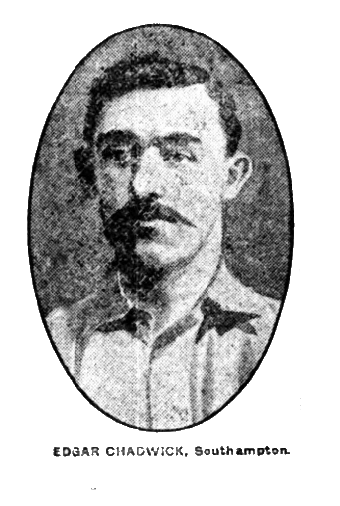
EVERTON v BLACKBURN ROVERS
Liverpool Daily Post - Monday 24 February 1902
At Goodison Park, before about 10,000 spectators. Teams;- Everton.- Kitchen, goal; Balmer and B. Sharp, backs; Wolstenholme, Booth (Captain) and Abbott, half-backs; Sharp, Taylor, Young, Bone, and Chadwick, forwards. Blackburn Rovers.- McIver, goal; Crompton (Captain)and Darroch, backs; Howarth, McClure, and Houlker, half-backs; Whittaker, Somers, Dewhurst, Morgan, and Blackburn, forwards. Mr. F. Kirkham acted as referee.
Almost right off the visitors forced a corner, but this was cleared by Wolstenholme, but again the Blackburnians came, and Balmer had his hands full with Dewhurst. Kitchen was the first to use his hands, and then the spirited attack of the Rovers was very prominent, and just under twenty minutes they were amply rewarded for, from Whittaker’s centre, after Balmer failed to intercept, Dewhurst, with almost an open goal, gave Kitchen no chance of saving, and the goalkeeper had to use bis feet to keep out Whittaker, the lively outside right of the visitors. Mainly through J. Sharp, Everton had the chance of drawing level, bur McIver threw himself at Bones’ shot, and got it away. Another long shot by Young was equally well saved by McIver, who was strongly aided by his confreres in front. Kitchen was in good form, for he afterwards disposed of a rasper front McClure amidst excitement. Much applause greeted the Everton efforts Io equalise, but despite good play J. Sharp, Young, and Chadwick to find an opening. McIver defended stoutly, and the wished-for goal did not come. After Somers had shot ineffectually at Kitchen. J. Sharp was once more prominent, and Taylor and he clearly beat all but McIver, the Everton inside right shooting with good intention only to see a corner accruing from his efforts. Close on half-time Dewhurst passed to Somers close in, and the latter shooing low and straight. Kitchen had the dire misfortune of allowing the ball to slip through his hands and into the goal. Everton failed to score, and half time the Rovers led by 2 goals to nil. After changing ends the game continued to be warmly contested, but the Rovers were the better team, although Everton worked hard, but made no use of chances to score. The Roverscentres were always good, and their shots were anything but of the ludicrous order, and despite their two goals lead they did not relax their efforts right up to the finish. Result: Blackburn Rovers 2 Everton nil.
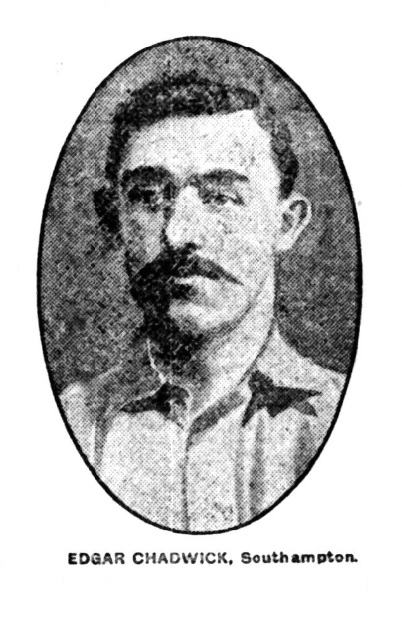
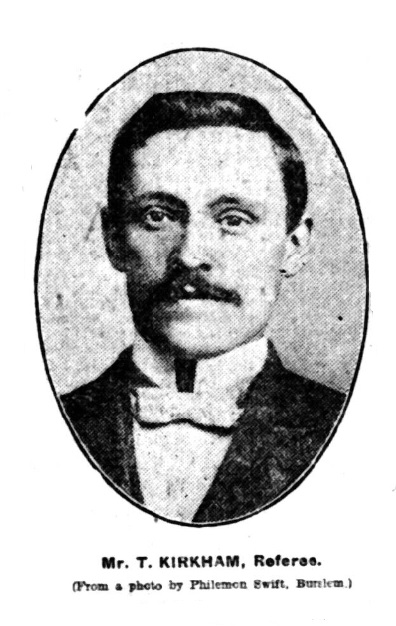
EVERTON STUFF
Sheffield Daily Telegraph - Tuesday 25 February 1902
The Everton Football Club asked a question as to whether the recent decision of the Council that a V-shaped rut was not a suitable mark in accordance with the laws as a boundary line should be enforced in protests. The council agreed that no penalty should be imposed this season.